Clinics 50th Anniversary
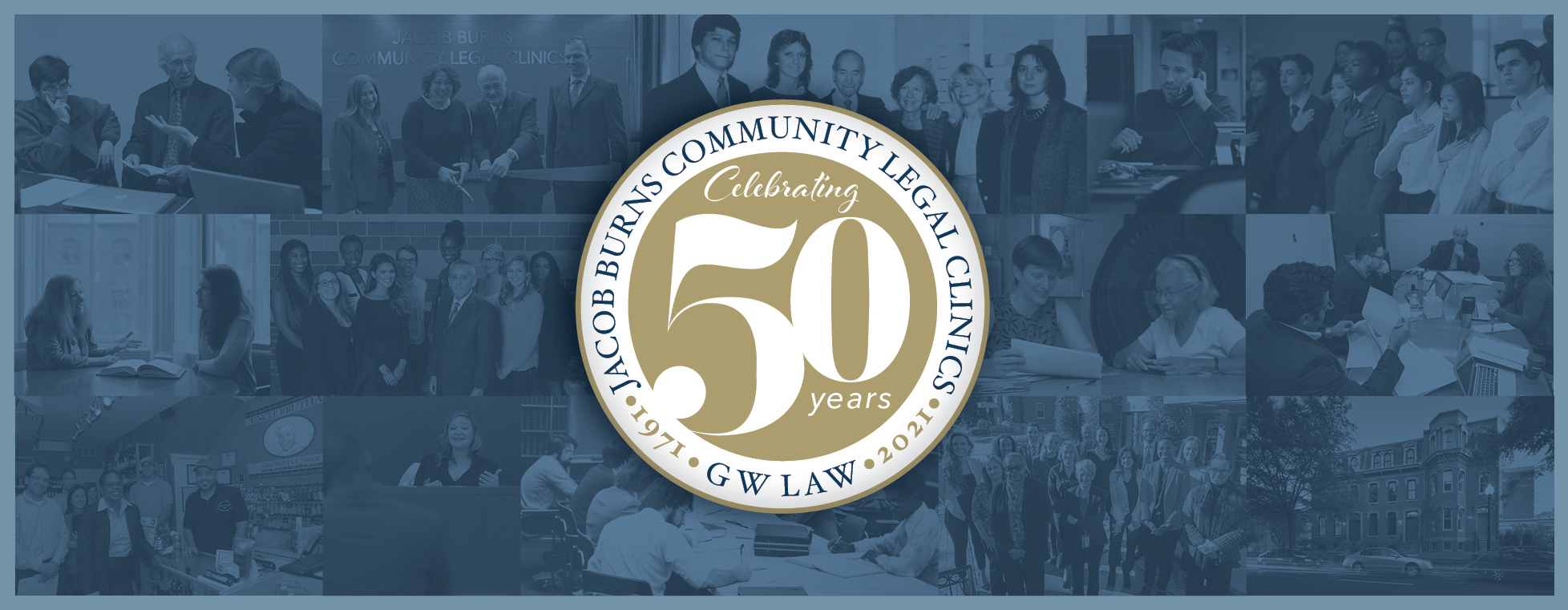
Since 1971, the George Washington University Law School (“GW Law”), has recognized the critical role of clinics in helping law students learn crucial substantive law and develop vital skills while also providing direct legal services to clients who may not otherwise have access to justice or economic opportunity. Through a series of events over the next several months, we are honoring our history of leadership in clinical legal education and our stellar alumni/ae network.
Clinic Alumni/ae Profiles
To celebrate the 50th anniversary of the Jacob Burns Community Legal Clinic at GW Law (“Clinical Program”), alums around the globe have taken the time to reflect on their experiences in Clinic. Reflections from our Clinic alums are accessible here.
History Timeline
This interactive timeline, developed by the Clinical Program with the support of the Jacob Burns Law Library, traces over 50 years of the Clinic Program’s history from 1968-2022. As with all historical research, this timeline is a work in progress. We invite you to enjoy exploring many significant highlights from our history. Please send feedback to: [email protected].
Making History in DC
Student Leadership
Clinic Administration
Clinic Growth & Expansion
Holistic Community Support
Community Partnerships
1968-1979: Pre-Clinic Programs and the Crusade to Change Legal Education
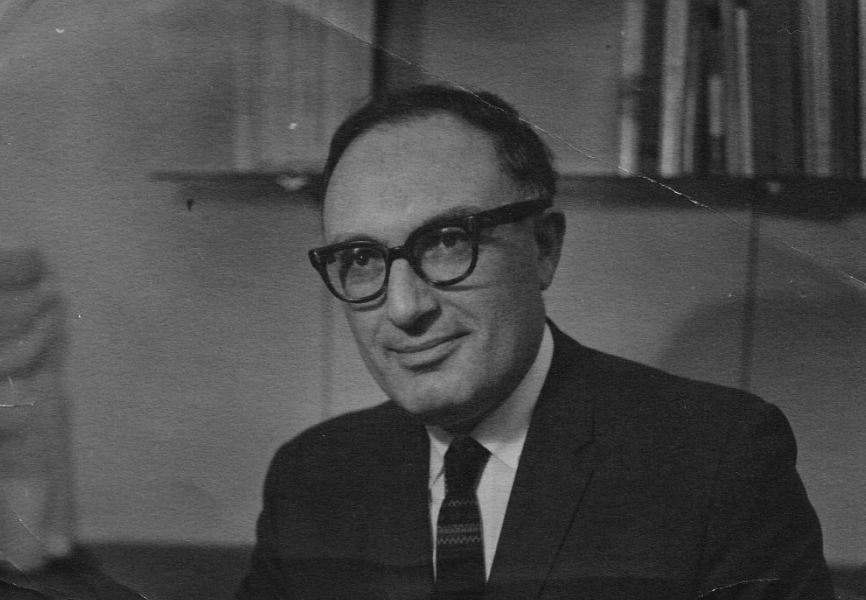
Bill Pincus
1959-1968
From 1959-1968 GW Law alumnus William “Bill” Pincus (JD ‘53), the visionary who conceived of the idea of clinical legal education, funded two-year pilot clinical programs across the nation through his position as an executive with the Ford Foundation. He envisioned clinics much as they are today — as programs supervised by law school faculty which would give academic credit to students for lawyer–client experiences that would promote access to justice and teach professional responsibility. Bill Pincus’ clinical legal education model has since been replicated within GW’s Clinical Program and in law schools nation-wide.
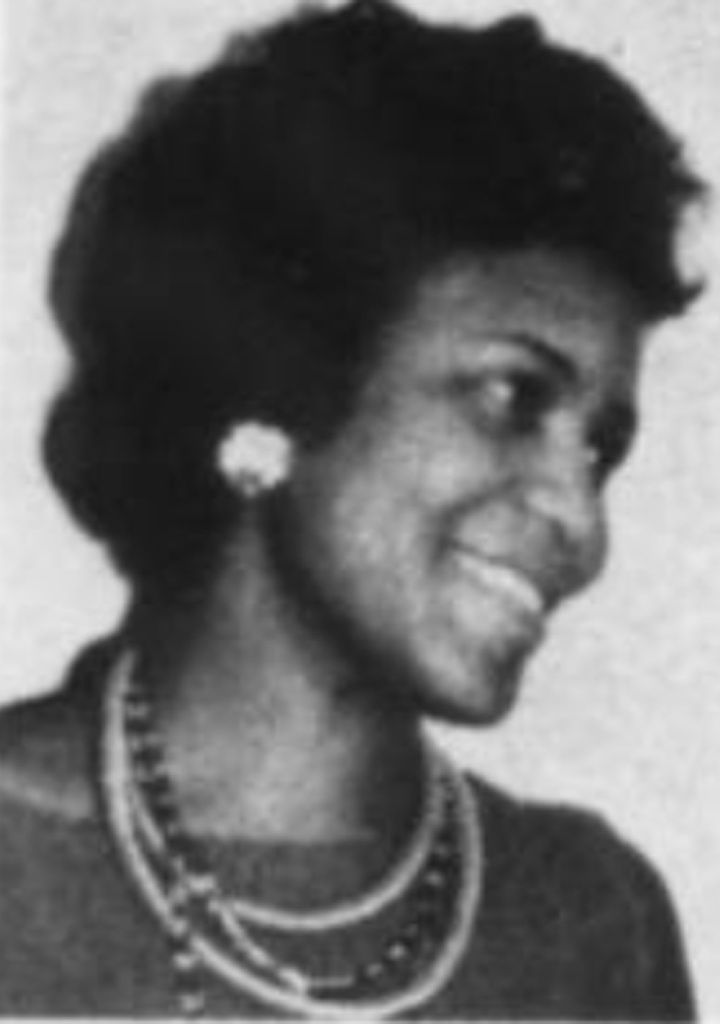
Jean Camper Cahn
1968
The late Professor Jean Camper Cahn, founded and directed the Urban Law Institute (ULI) at GW, which operated until 1971. Professor Cahn was a bold advocate for marginalized residents and a pioneer in GW Law's experiential learning curriculum. ULI was funded by a three-year grant from the Office of Economic Opportunity administered jointly through its Office of Legal Services (OLC) and Volunteers In Service to America (VISTA) in conjunction with GW Law. ULI recruited law students to become VISTA Volunteer Lawyers and serve as advocates for DC's low-income residents, and focused on elevating the interests of indigent clients consistent with its philosophy that “law can be a real tool to change the condition of the urban poor.” ULI went against the grain in its mission by creating a movement of third-year law students nationwide demanding that the law firms who have offered them employment commit to supporting poor clients. Rather than solely supporting clients with pro bono litigation, ULI strongly advocated for the importance of providing more proactive pro bono legal services such as interpreting regulations, drafting proposals, negotiating agreements, and coordinating resources.
1970-1971
With the spirit of GW Law Alumnus Bill Pincus (JD, ‘53) and Professor Jean Camper Cahn of the ULI, the Consumer Help Project and DC Law Students in Court (now called Rising for Justice) became the first two official clinic programs. The Consumer Help Clinic was founded by the late Professor Donald P. Rothchild and evolved into the Consumer Litigation and Consumer Mediation Clinics. DC Law Students in Court engages students from law schools across the city and provides legal representation, assistance, and counseling to low-income clients.
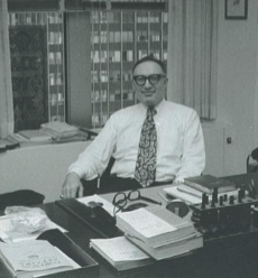
Bill Pincus in his office
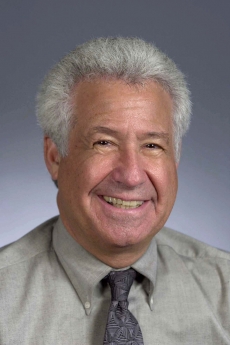
Eric S. Sirulnik
1971-1972
Professor Willie Leftwich (JD, ’67, LLM, ’71) served as the inaugural Clinical Dean for a semester and in 1972, Professor Emeritus Eric S. Sirulnik (LLM,’70) began his leadership of the Clinical Program. He led the Clinical Program as the Clinical Director and Dean for Clinical Programs, Research & Development until 2002.
1973
GW Law’s Clinical Program continued growing modestly—in three small rooms on the third floor of the long-demolished Bacon Hall. The Clinics later took over the first floor of Bacon Hall until 1978. Staffing was likewise humble. One early hire was office manager Norma Lamont, who supported the Clinic’s administrative efforts until 2019 . Her tireless efforts, skilled grant-writing, and connections in the DC community were invaluable in building the financial infrastructure of the Clinics. She retired from her role as Director of Clinic Support Services after more than four decades of service to the Clinics.
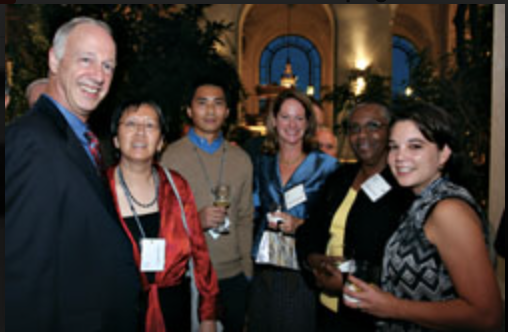
From Left: Professor Emeritus Peter Meyers, JD ’71, and his wife, Laura Chin, MA ’71; Jerome Lopez; Alice Sullivan Fitzgerald, JD ’86; Norma Lamont, Former Director of Legal Clinic Support Services; and Former Visiting Associate Professor Elizabeth L. Young, JD ’04.

1977
The Small Business Clinic launched, providing free start-up legal services to Washington, DC, area organizations under the leadership of Clinical Director and Dean for Clinical Programs, Research & Development Eric S. Sirulnik. The clinic was the first transactional clinic in the U.S. and launched as the local legal specialty center for the U.S. Small Business Administration’s Small Business Development Program, represents micro-businesses with start-up capital of $500 to $35,000, and was initially supported by a grant from the U.S. Small Business Administration.
1978
From 1978 to 1980, while awaiting the conclusion of the highly anticipated construction of the new GW Law School complex, the Clinical Program occupied a building on the corner of 20th and L Streets, NW. After the Law School building project concluded, the Clinical Program returned to an upgraded space in Stockton Hall.
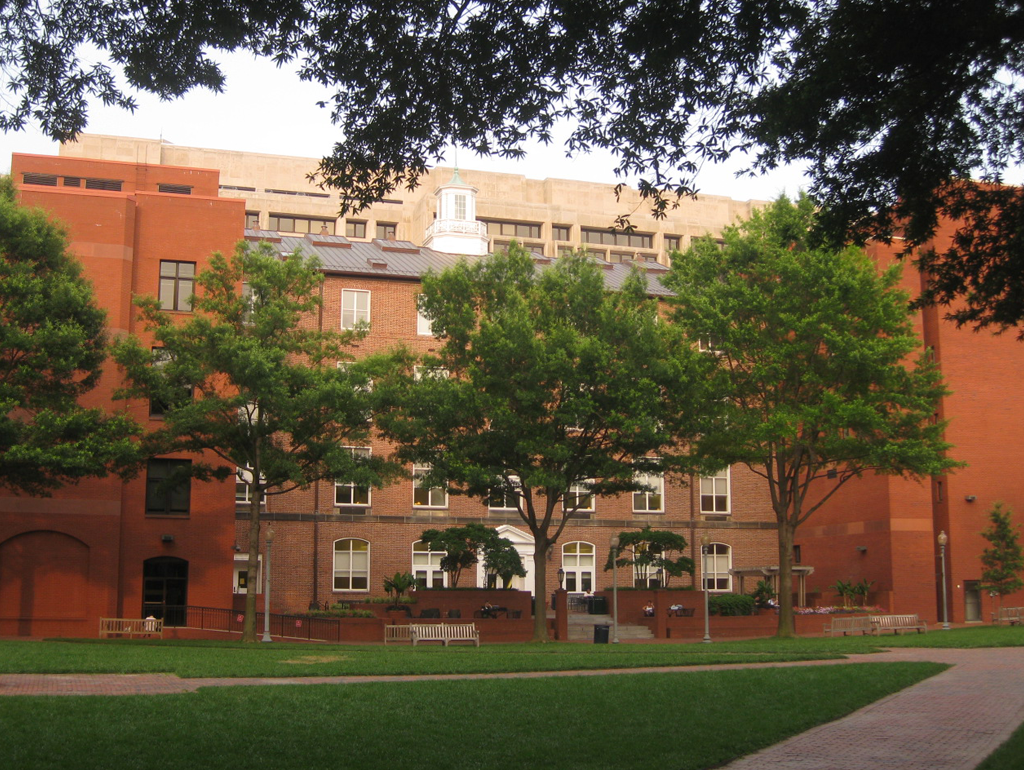
Stockton Hall
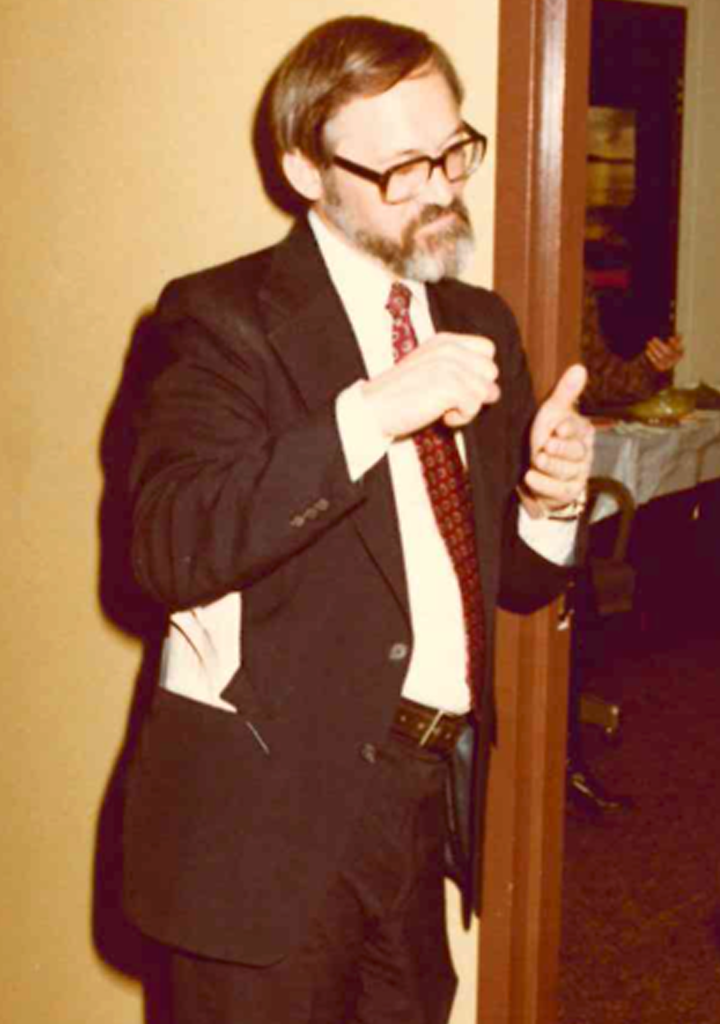
Randle Gannon of The National Association of the Deaf (NAD)
The National Center for Law and the Deaf (the Center) began as a cooperative venture between the GW Law and Gallaudet. The Center provided pro bono legal counseling to deaf clients on the campus, using sign interpretation for all client meetings.
1979
The Immigration Clinic was founded. It was originally operated by second and third-year students under the supervision of Professor Richard Boswell (JD ’79). The Immigration Clinic was funded during its first year by a grant from the Department of Education’s clinical legal education program.
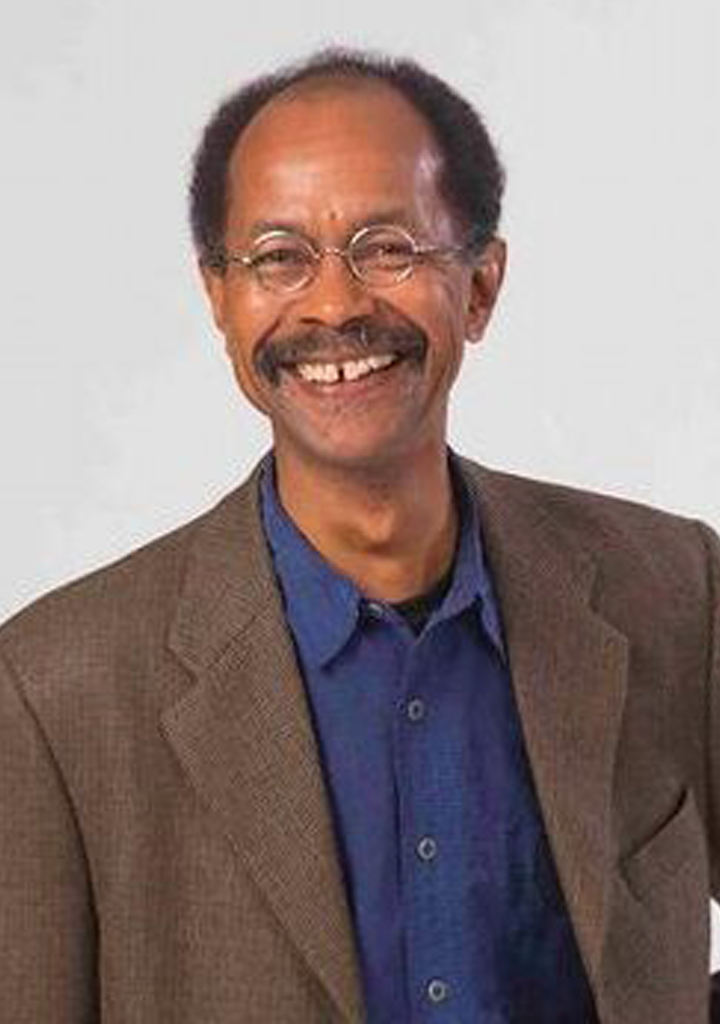
Richard Boswell
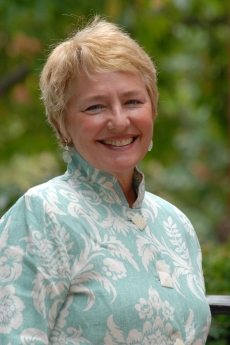
Joan H. Strand
Professor Joan H. Strand joined the Law School faculty and directed the Civil & Family Litigation Clinic, after having supervised students in the DC Law Students in Court Program (now called Rising for Justice). Professor Strand commented: “We all did everything. We were stretched thin. There was no specialization. No interns or fellows.” Early supervising attorneys were Michael Zeldon and Robinwyn Lewis.
1980-1989: Expanding on a History of Clinical Excellence
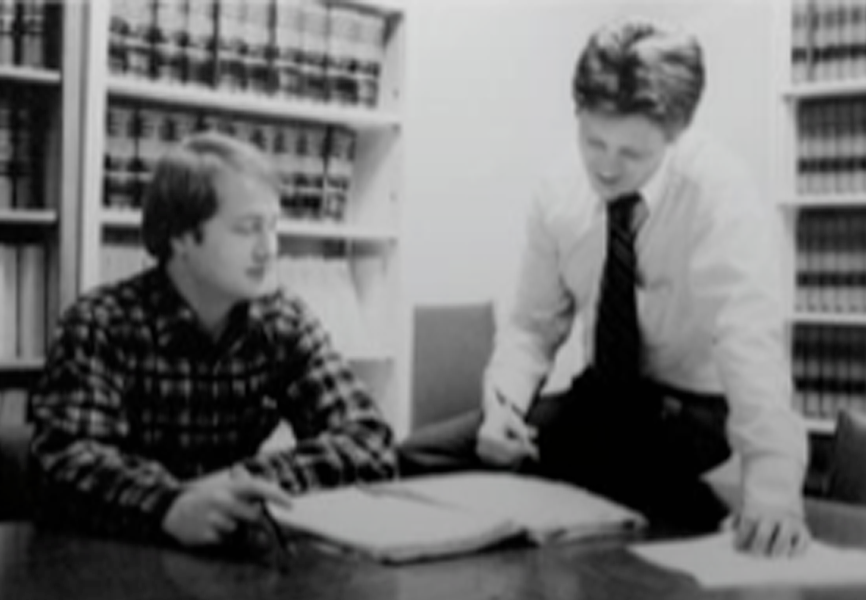
The late Professor Stephen Joseph Del Guidice (Right) with a GW Law student.
1980
In the 1980’s the late Professor Stephen Joseph Del Guidice began teaching the Clinic’s Administrative Advocacy Clinic, Advocates for Older Peoples (AOP) program. He taught this for nearly ten years. The Clinic represented indigent and elderly clients pursuing their rights and benefits before various local and federal agencies.
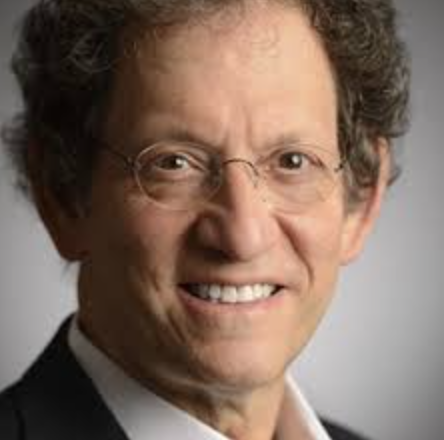
David Medine
1986
Professor Emerita Carol L. Izumi launched the Consumer Mediation Clinic which continued through 2010. In her words, “GW Law School embraced alternative dispute resolution early on,” Izumi explains. “For many years, we were the only law school clinic that gave students a chance to work with people as neutral mediators rather than as legal representatives.” Early support for the Consumer Mediation Clinic was provided by supervising attorney David Medine.
1987
The Jacob and Charlotte Lehrman Foundation Clinical Scholarship Fund was established by donation to create the Student Director Lehrman Scholarship. Since 1987, dozens of impressive public service-minded clinic students have served in this role.
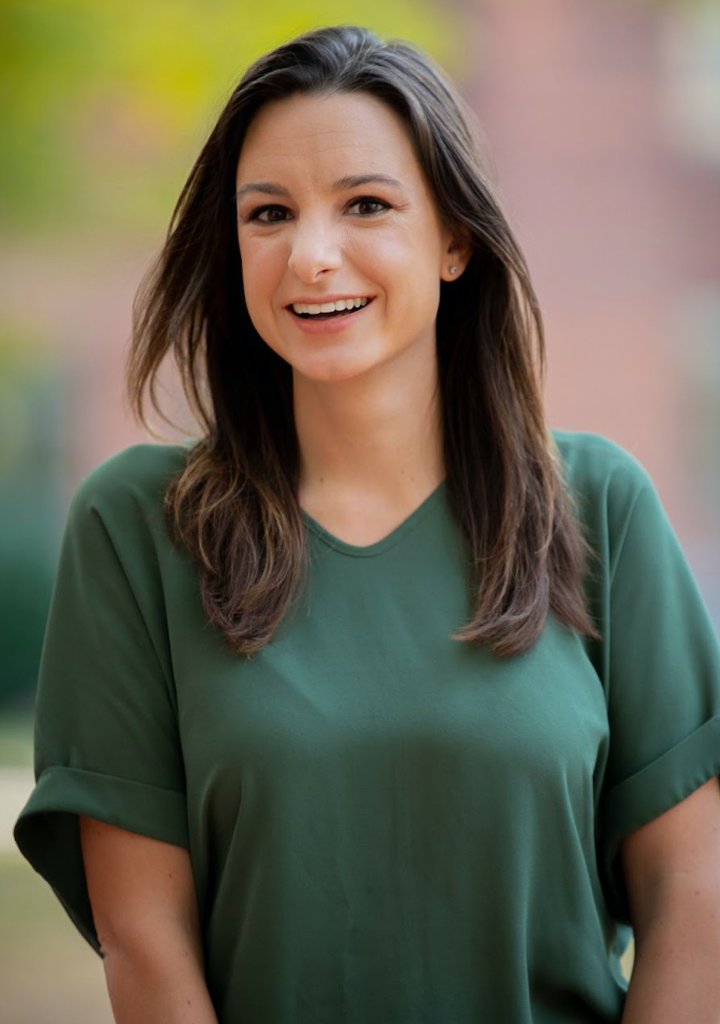
Brittany Gault, 2022-2023 Student Director
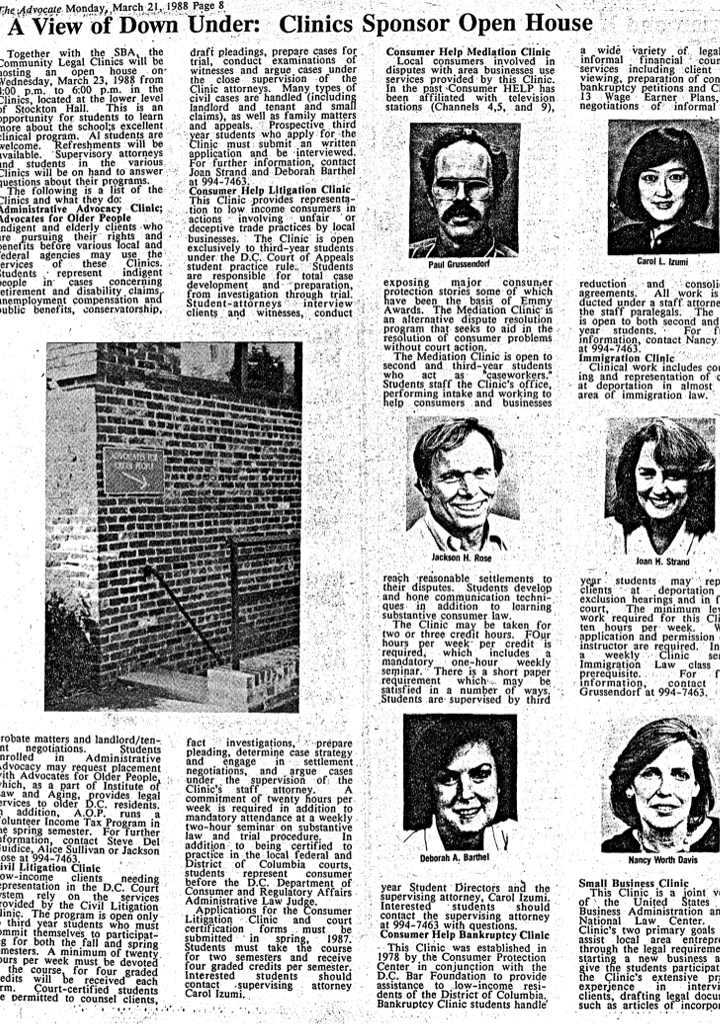
The Advocate, March 21, 1988
1988
The Administrative Advocacy Clinic’s AOP program continued under the leadership of Professors Joan H. Strand and Deborah Barthel. The Clinic represented indigent and elderly clients pursuing their rights and benefits before various local and federal agencies. Students in the Clinic represented clients seeking retirement and disability claims, unemployment compensation, and in public benefits and conservatorship cases.
By 1988, the Immigration Clinic was directed by Professor Paul Grussendorf. At this time, student attorneys in the Immigration Clinic had the opportunity to counsel clients at deportation and exclusion hearings. The Clinic worked in almost every area of Immigration law.
Professor Susan R. Jones became the director of the Small Business Clinic which she expanded to the Small Business & Community Economic Development Clinic (“SBCEDC”) with grant support from the Legal Services Corporation. The SBCEDC has served as an important early model for transactional clinics as well as a role model for emerging international counterparts. Prior to Professor Jones’ appointment, early support for the Clinic was provided by supervising attorney Dan Gropper. Professor Jones later served as Interim Associate Dean of Clinical Affairs in 2005 while Professor Emerita Carol S. Izumi was on sabbatical.
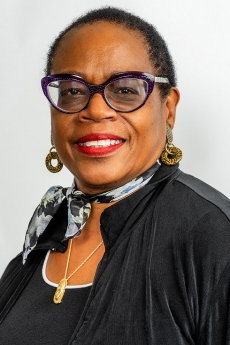
Susan R. Jones
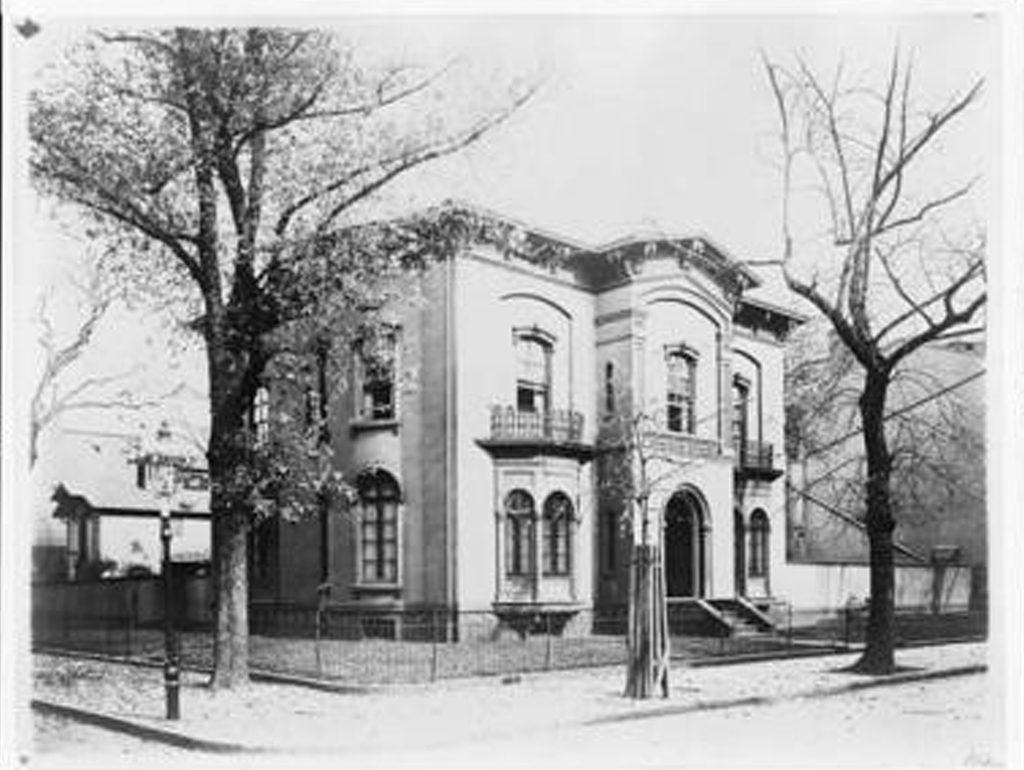
2000 G Street Historic Property
1989-Early 1990's
In 1990, the original G Street townhouses across the street from the Law School complex at 2000 G Street became the property of the Law School. Fourteen years earlier in 1976, this complex was designated as a National Historic Landmark and a District of Columbia Historic Site. The Law School expended considerable effort to preserve the G Street townhouses, and in doing so, the Law School preserved a remnant of a rich and storied history involving former residents dating back to the Titanic, who engaged in heroic efforts. By 1996, the Clinic had begun occupying parts of the G Street townhouses. The entire space later became the Clinical Program’s permanent home.
1990-1999: A New Surge of Clinic Expansion
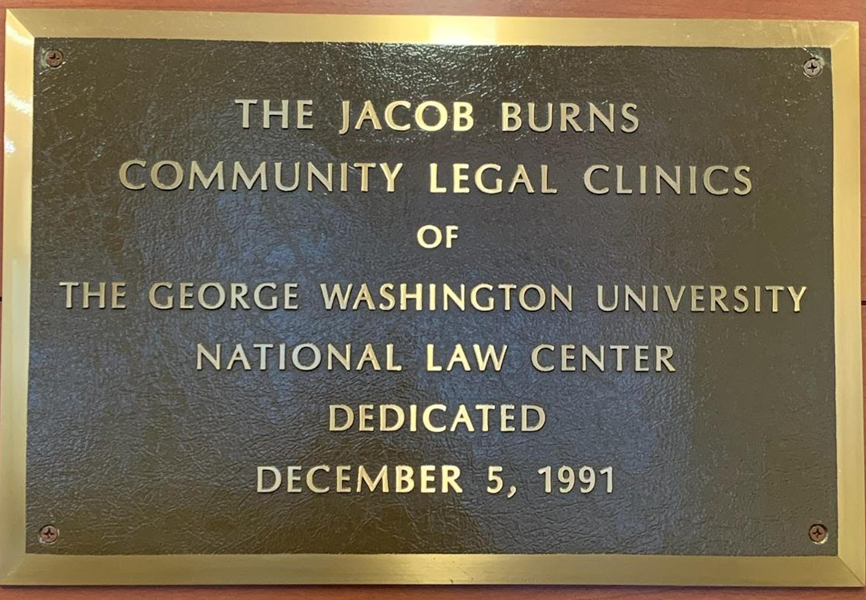
1991
The Clinics were dedicated to acknowledging the generous support of Jacob Burns (LLB '24, Hon. LLC '70). A longtime trustee of the University, Burns (1902-1993) was renowned as a lawyer, artist, and philanthropist. GW Law is proud to honor this significant contribution to the "uplifting and maintenance of the legal profession," and his fearless advocacy of the principle of "equal justice under the law."
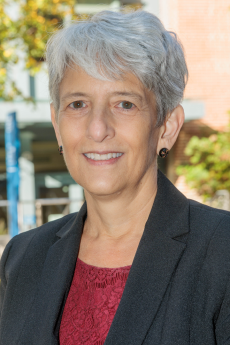
Joan S. Meier
1991-1993
In 1991, Professor Joan S. Meier was hired to co-teach the Civil Litigation Clinic with Professor Joan H. Strand. In 1993, she separately launched the Domestic Violence Advocacy Project (DVAP), one of the nation's very first domestic violence clinics - in which she taught and supervised students representing victims of domestic violence in civil protection order cases. Several years later, Professor Meier received a federal grant from the federal Office on Violence Against Women to launch the Domestic Violence Emergency Department Clinic (DVED), in which students were on all-night shifts with beepers and responded to victims in local emergency rooms to do risk assessment and safety planning. DVED was one of the earliest medical-legal partnership clinics in the country. The grant also allowed Professor Lisa DeSanctis to be hired; she co-taught DVAP and enabled Professor Meier to launch DVED.
In 2003, Professor Joan S. Meier created a third new clinical teaching model, the Domestic Violence Project (DVP), which continues to this day. The Domestic Violence Project (DVP) leverages the best aspects of a field placement and of clinical legal education, placing students in a wide spectrum of different types of community organizations providing legal advocacy for survivors. Students in the DVP engage variously in criminal litigation, civil litigation, immigration work, policy and legislative advocacy, research, and child advocacy in their placements, while learning from each other about the different types of work that are possible in the domestic violence field. At this time, Professor Joan S. Meier launched the Domestic Violence Legal Empowerment and Appeals Project (DVLEAP), an independent non-profit organization, for which she raised the funds, recruited and managed the Board of Directors, and performed appellate litigation around the country and in the U.S. Supreme Court, with the assistance of pro bono lawyers in DC's major law firms. DVLEAP is one of the many community organizations where DVP places students, and many of them work on Supreme Court and other appellate briefs.
1992-1993
Early support for what would become GW Law's Criminal Appeals and Post Convictions Services Clinic (CAPS) (formerly known as the Federal Criminal Appellate Clinic) was provided by supervising attorney Deborah Caplan. Professor Emeritus Peter H. Meyers, an experienced litigator, directed GW Law’s CAPS from 1992 to 1993 until Professor Jenny Lyman joined and began directing CAPS. In 1994, Professor Emeritus Peter H. Meyers engineered the Law School’s expansion into new territory with the launch of the one-of-a-kind Vaccine Injury Litigation Clinic.
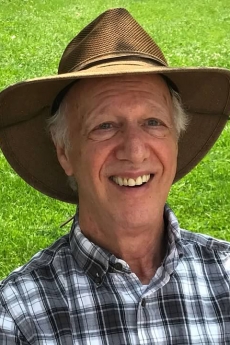
Peter H. Meyers
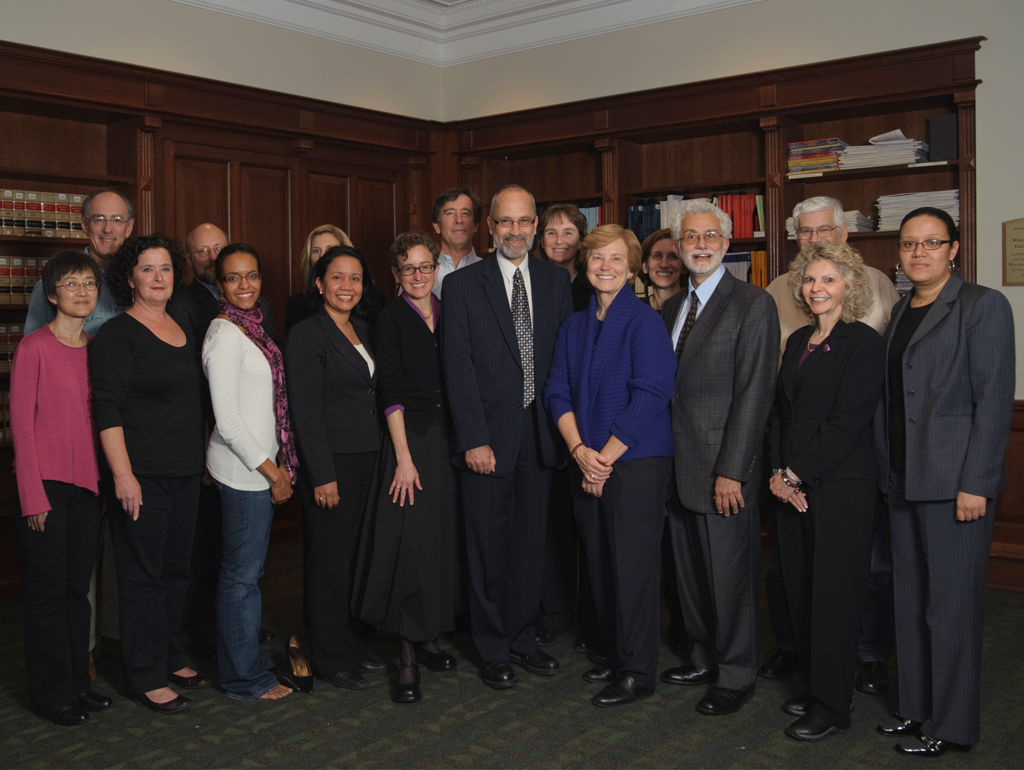
Carol L. Izumi and colleagues at Consumer Mediation Clinic Roundtable
1993
The Consumer Litigation, Mediation, and Bankruptcy Clinics were combined with the GW Civil Litigation Clinic. Together, they became known as the Consumer Mediation Clinic.
1994
The Vaccine Injury Litigation Clinic led by Professor Emeritus Eric S. Sirulnik and Professor Emeritus Peter H. Meyers was established, making it the first of its kind in the country. Students in the year-long clinic represent litigants seeking compensation for vaccine-related injuries and deaths and appear in trial, mediation, and appellate proceedings before the U.S. Court of Federal Claims and the Office of Special Masters. Funding for the clinic came from a Department of Education grant.
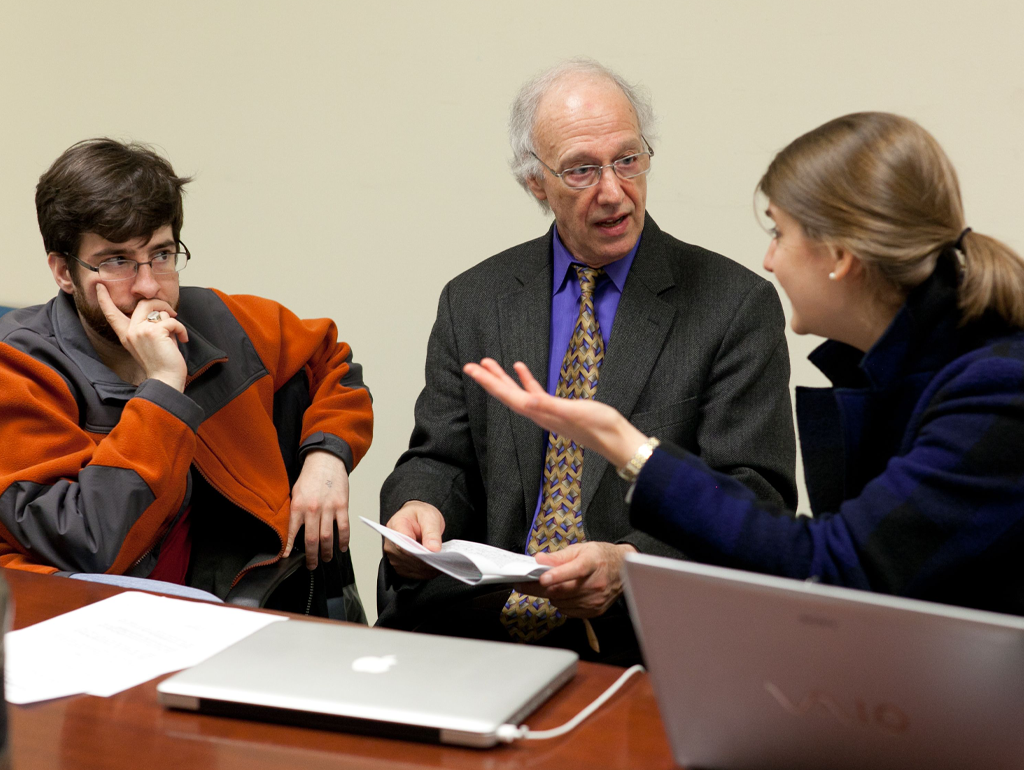
Peter H. Meyers and GW Law students
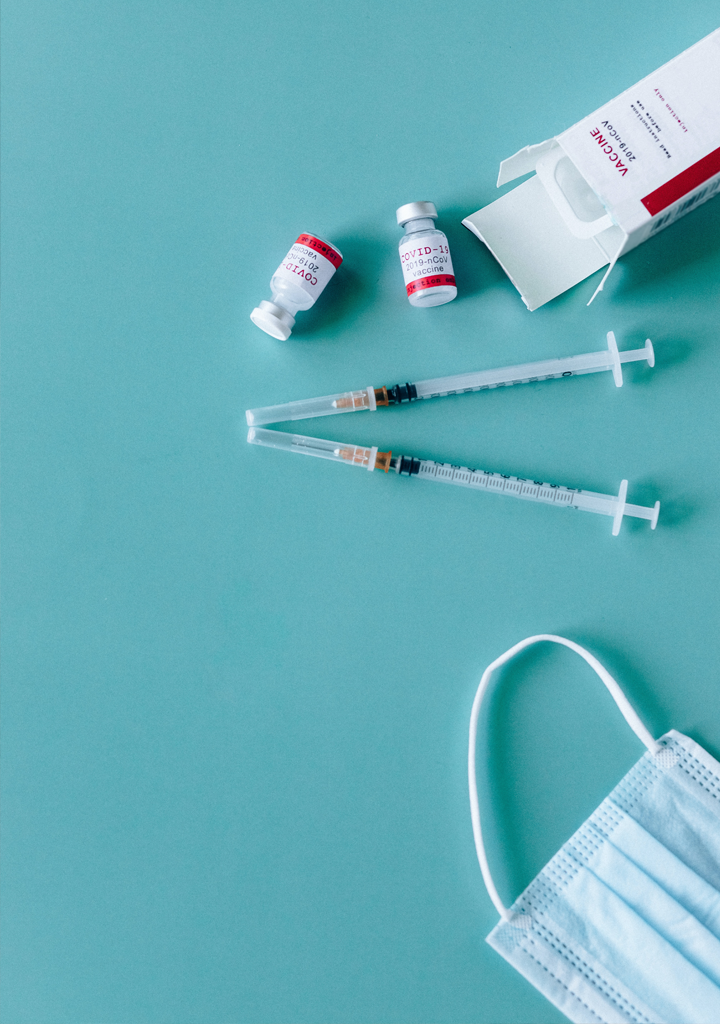
1995
The Vaccine Injury Litigation Clinic appeared before the Supreme Court as co-counsel on Whitecotton v. Donna E. Shalala, Secretary of Health and Human Services.
The Health Rights Law Clinic (HRLC) and the GW Health Insurance Counseling Project (HICP) were established by grant funding from the DC Office on Aging. The Health Rights Law Clinic was directed by Professor Sue Anderson. Additionally, the first Senior Attorney of the HICP enterprise was Michael Knipmeyer, Esq, RN where he served for thirty years.
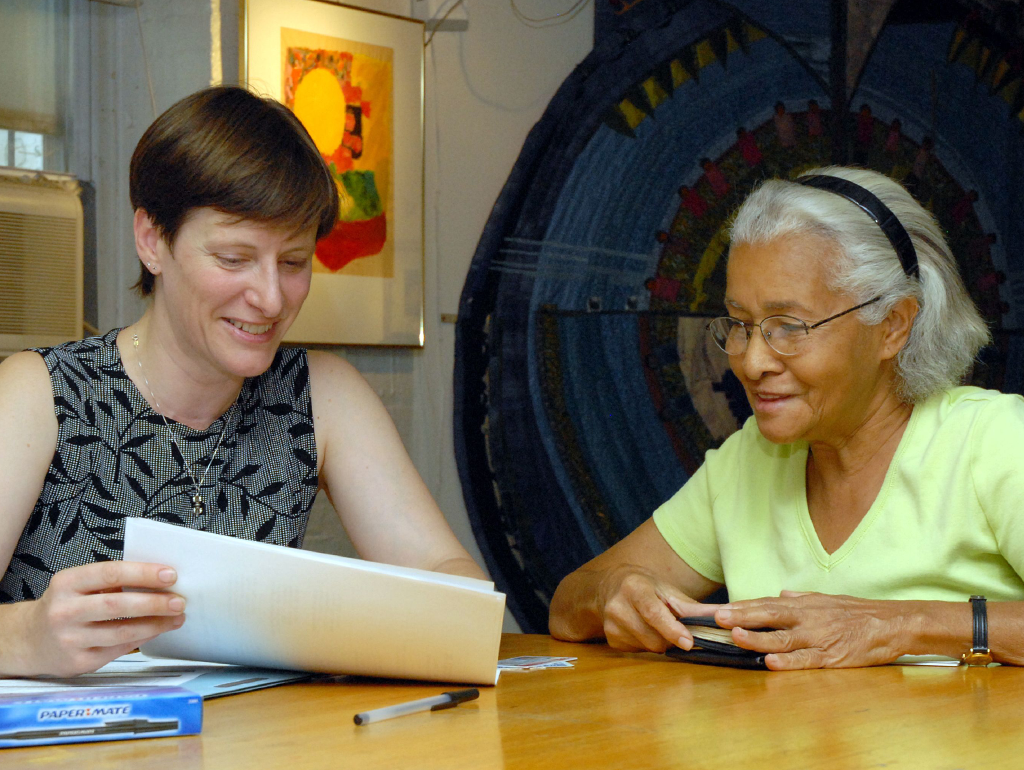
Professor Suzanne Jackson (Left) with a client
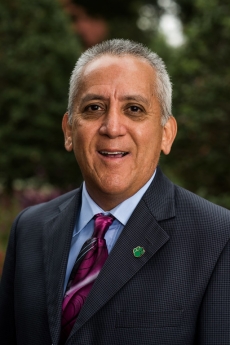
Alberto Benítez
1996
Professor Alberto M. Benítez joined the GW Law Faculty and began directing the Immigration Clinic which still exists today. In this clinic, students represent clients from around the world on immigration law matters, including removal proceedings and petitions for affirmative asylum, before federal administrative tribunals.
Attorney Philip Friedman of Friedman Law Offices, P.L.L.C filed a class-action lawsuit Bassin and Weems v. District Cablevision Limited Partnership, and he won in a landmark settlement resulting in an award of $13.7 million dollars to recoup a fortune in illegal late fees from cable television giants. Friedman generously asked the court to distribute $2.4 million to the Clinics, as part of a cy pres award. Mr. Friedman felt strongly that the money should go to “institutions that protect consumers in the District of Columbia and provide legal counsel to those least able to afford it.” He explained, “This was a community that was grossly underserved in terms of having access to courts and legal services.” Phillip Friedman’s gift became the largest gift directed to the Clinics in GW’s history. The Friedman Fellows Program was subsequently launched in 2008.
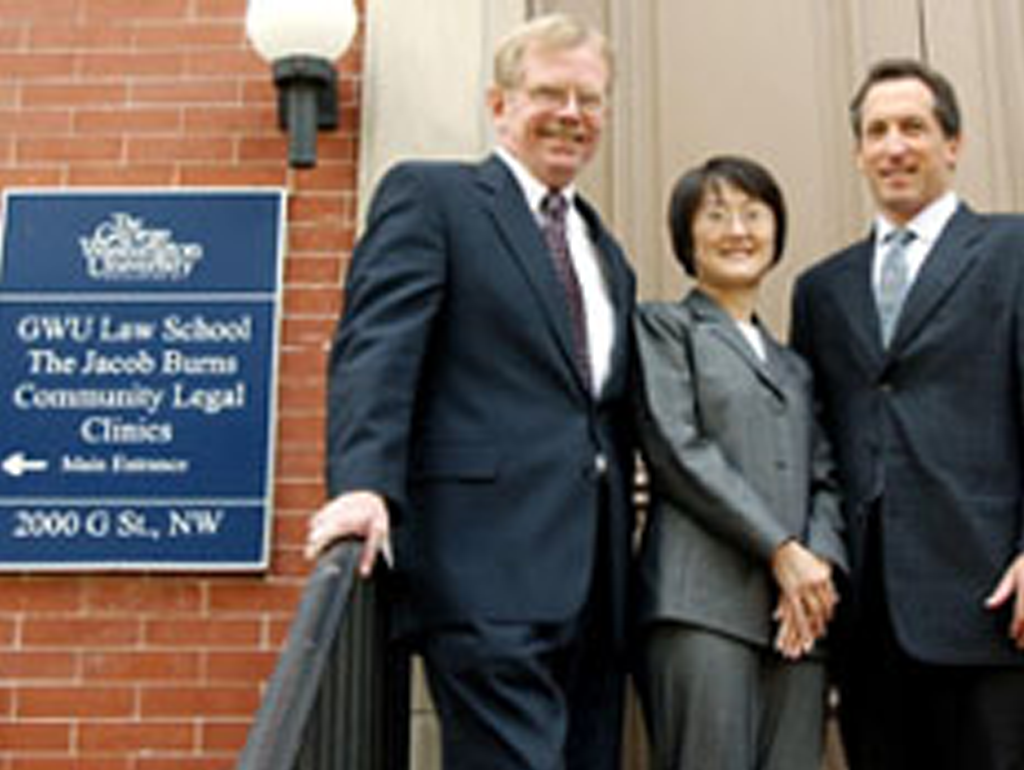
From left: Professor Roger Transgrud, Professor Carol Izumi, and Philip Friedman, Esq.
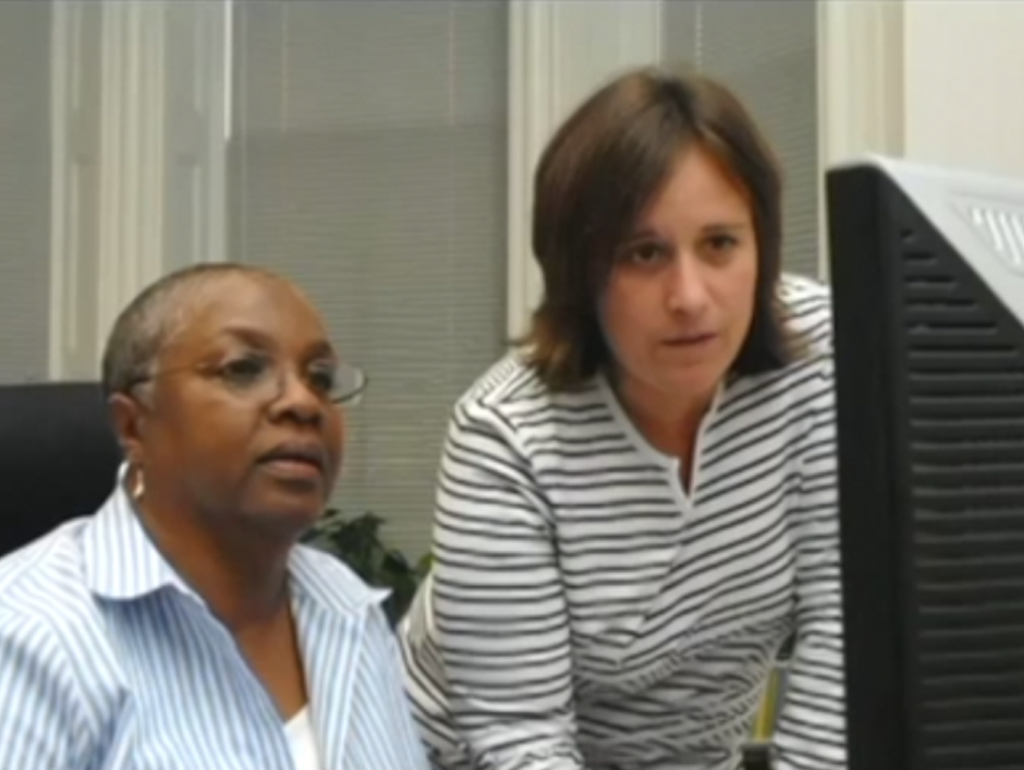
Milagros Tudela (Right) assists Clinics co-worker, Norma Lamont (Left).
Milagros Tudela joined the Clinical Program in 1996. She commenced her tenure as a receptionist and has served the Clinics in various critical roles, including as a translator for the Immigration Clinic. She is the Clinics Administrative Supervisor and is critical to the Clinics success.
2000-2009: Clinics in the 21st Century
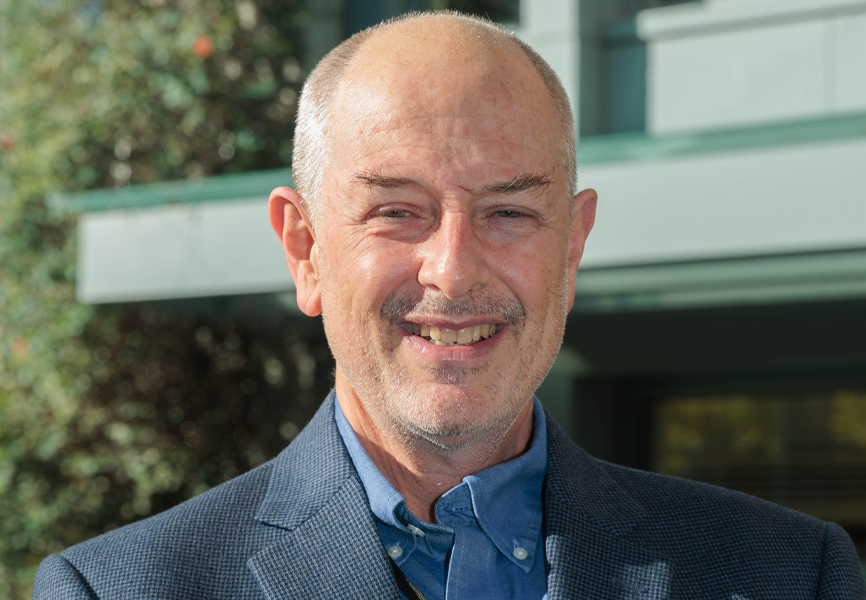
Jeffery S. Gutman
2000
The Public Justice Advocacy Clinic (PJAC) was launched by Professor Emeritus Lynn E. Cunningham and Professor Jeffrey S. Gutman. PJAC is a civil litigation clinic in which students represent clients in a range of matters that may include employment law, disability, law, Freedom of Information, government identification, and probate matters.
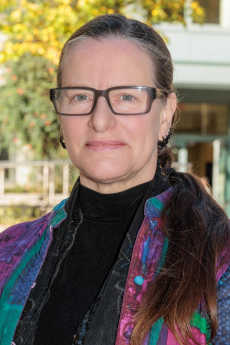
Suzanne Jackson
2000-2002
Professor Penny Lantz was hired to direct both the Health Rights Law Clinic (HRLC) and the GW Health Insurance Counseling Project (HICP) until 2002. Immediately after Professor Suzanne H. Jackson began leading the HRLC, adding to her decades of experience representing District of Columbia residents. "Student advocates have helped countless seniors and people with disabilities escape from crushing debts for health care, some big, some small, none insignificant to the people whose problems were solved," says Suzanne Jackson, director of the clinic. "Our students are honing their lawyering skills in this area of rapidly growing national importance."
Professor Emeritus Eric S. Sirulnik, former Clinical Director and Dean for Clinical Programs, Research & Development, formally transitioned out of the clinical deanship and into his emeritus status. As a leader of the Clinical Program, he encouraged the substantial development of clinical programs in civil litigation, elder law, immigration law, small business law, and vaccine injury law. Professor Sirulnik was interviewed by J.P. "Sandy" Ogilvy shortly before the conclusion of his deanship.
[video:https://vimeo.com/692408009 width:560 height:315 align:center lightbox:1 lightbox_title:Oral History of GW Law]
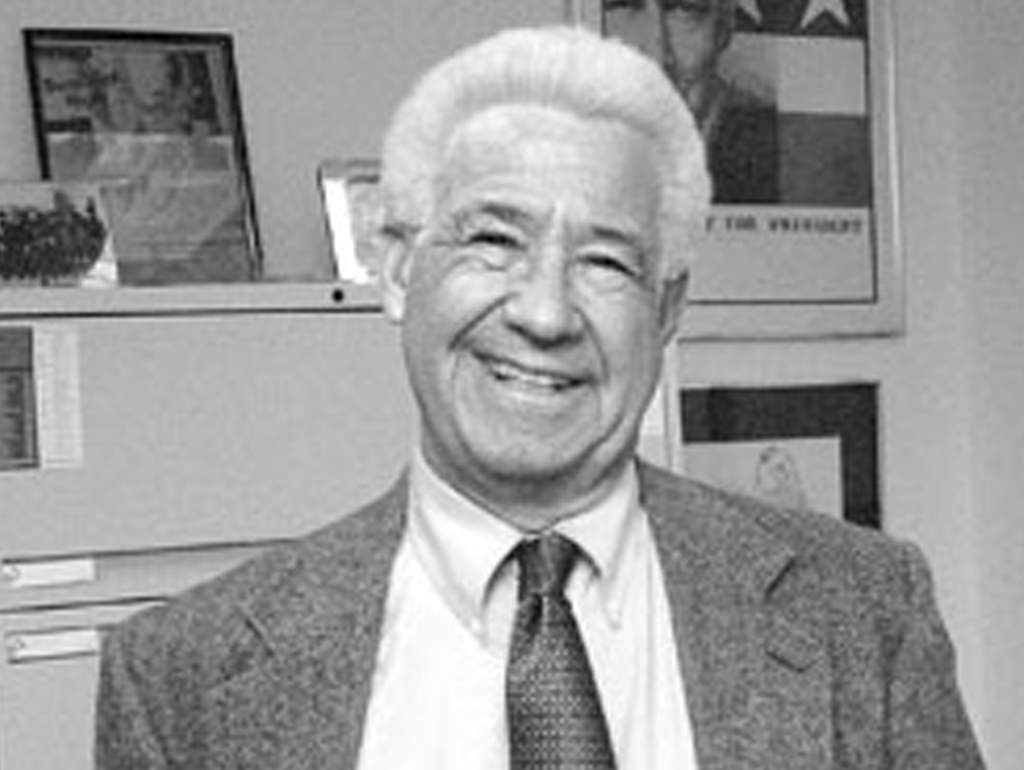
Eric S. Sirulnick
2003
The Eric Sirulnik Community Legal Clinic Fund was established through the generosity of David Z. Webster (LLB, ‘64). Named in recognition of Professor Emeritus Eric S. Sirulnik’s dedication to the Jacob Burns Community Legal Clinics this endowed fund supports the litigation efforts of the Clinical Program.
Professor Emerita Carol L. Izumi, the first Asian American Woman appointed as a GW Law faculty member, served as Director of Clinical Programs and Associate Dean of Clinical Affairs until 2007. Prior to taking on this role, she spearheaded the various consumer clinics. In her words, “we were one of the first law schools in the country to have a mediation, small business, immigration law, and international human rights clinics, and are still the only school with a vaccine injury clinic.”
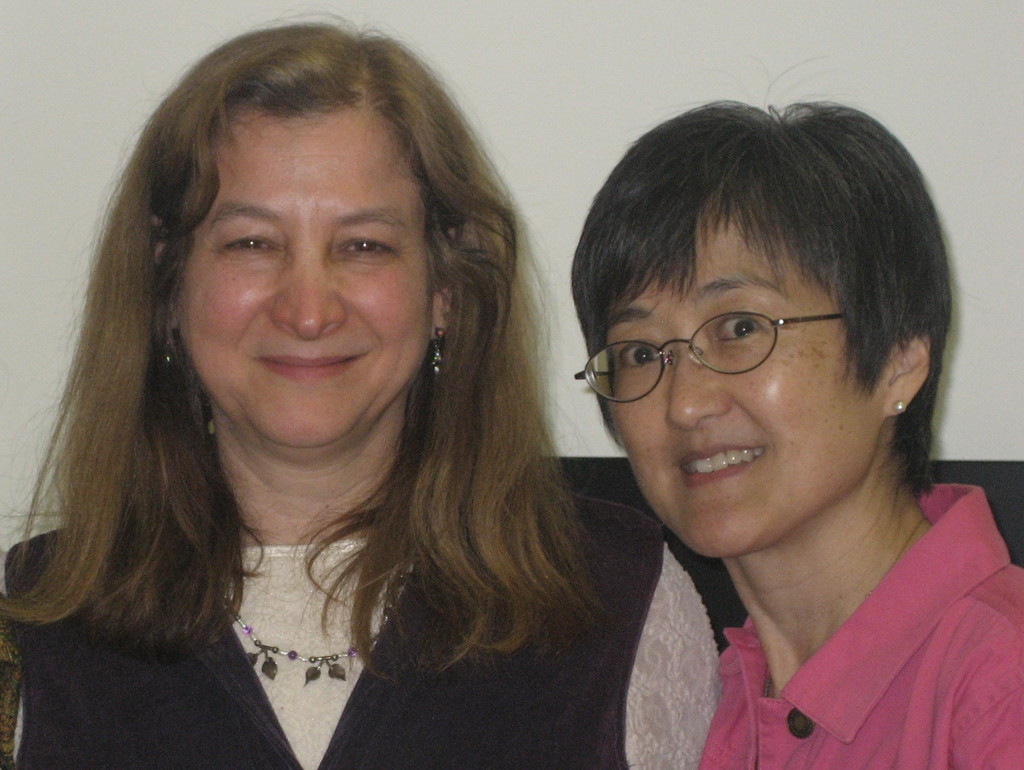
Professor Carol L. Izumi (Right) with Phyllis Godfarb
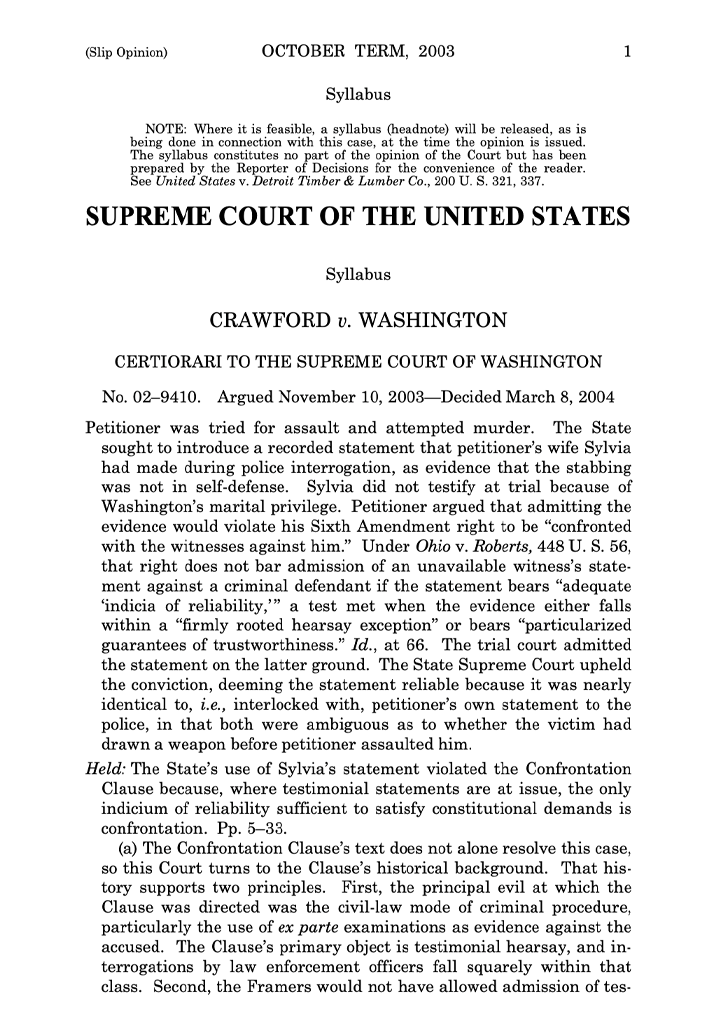
2004
The Criminal Appeals and Post Convictions Clinic (CAPS) (formerly the Federal, Criminal, and Appellate Clinic) won a case in the intermediate appellate court in Maryland that garnered the Clinical Program publicity. It generated the first published opinion in Maryland to apply the Supreme Court interpretation of Confrontation Clause rights as articulated in Crawford v. Washington 124 S. Ct. 1354 (2004).
2005
Professor Emeritus Lynn E. Cunningham, formally transitioned out of his clinical teaching role and into his emeritus status after dedicating 9 years of service to the Clinical Program while serving as a member of the clinic faculty.
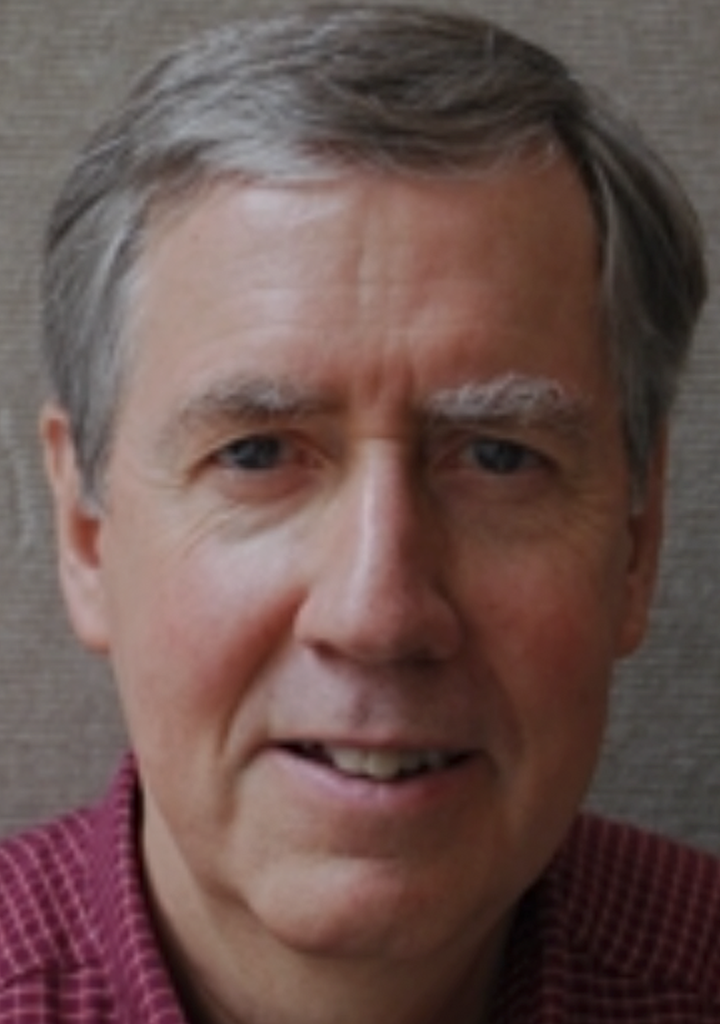
Lynn E. Cunningham
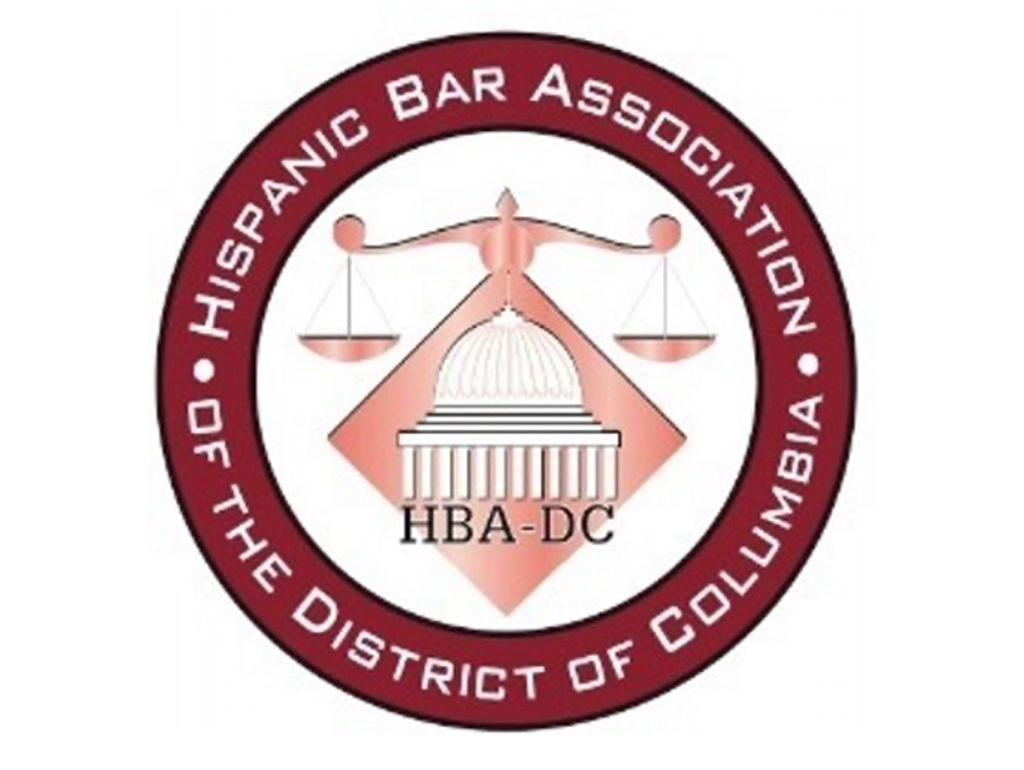
In 2005, the Hispanic Bar Association of DC gave its 2005 Hugh A. Johnson, Jr., Award to the George Washington University Law School’s Immigration Clinic. This award recognized the excellent lawyering provided by law students who had participated in the Immigration Clinic since it was founded. It also recognized the exemplary work of Professors Richard Boswell and Paul Grussendorf.
Professor Arturo J. Carrillo joined the faculty to teach GW Law’s International Human Rights Clinic (more recently called the Civil and Human Rights Law Clinic) and the Human Rights Advocacy seminar, where students are introduced to the professional practice of law in the cross-cultural context of international human rights advocacy. The clinic bridges theory and practice by working on live case projects that address a range of contemporary issues in the human rights field.
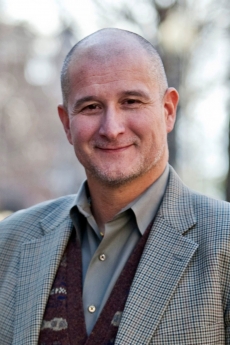
Arturo Carrillo
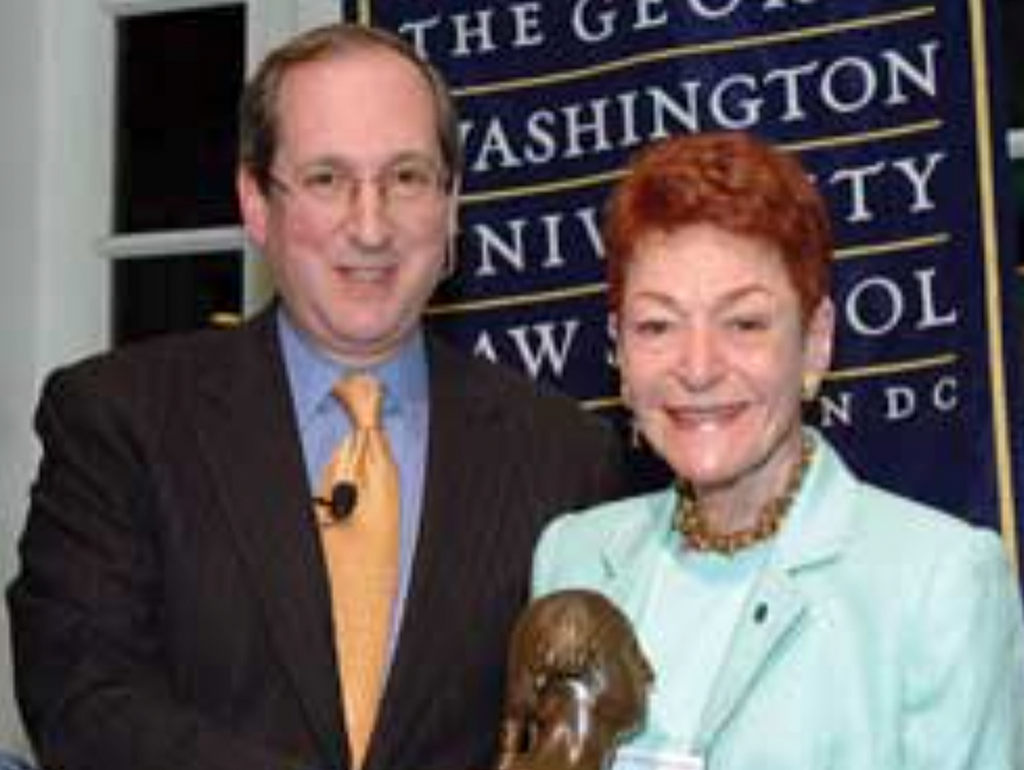
Dean Frederick M. Lawrence (Left) presents Dr. Rosalie Burns with a bust of George Washington at a spring dinner of the GW Law School advisory boards
2006
A generous $2-million pledge from the Jacob Burns Foundation was designated toward endowing a clinical chair. Dr. Rosalie Burns, daughter of Jacob Burns and Executive Vice President of the Burns Foundation remarked that “through the endowed clinical chair, we’ll help ensure that the clinics will continue to have strong leadership and provide important services to the Washington community.”
In 2006, Professors Jenny Lyman and Anne K. Oleson concluded their co-directorship of the Criminal Appeals and Post Convictions Clinic (CAPS) (formerly the Federal Criminal & Appellate Clinic) which they had done since 1999. Professor Anne K. Oleson began serving as lead director. Since the early ’90s, CAPS has represented indigent clients on appeal and in state post-conviction proceedings in serious felony cases. Each student handles a whole case as lead counsel—from opening brief through court decision.
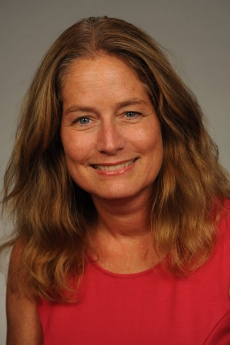
Anne K. Oleson
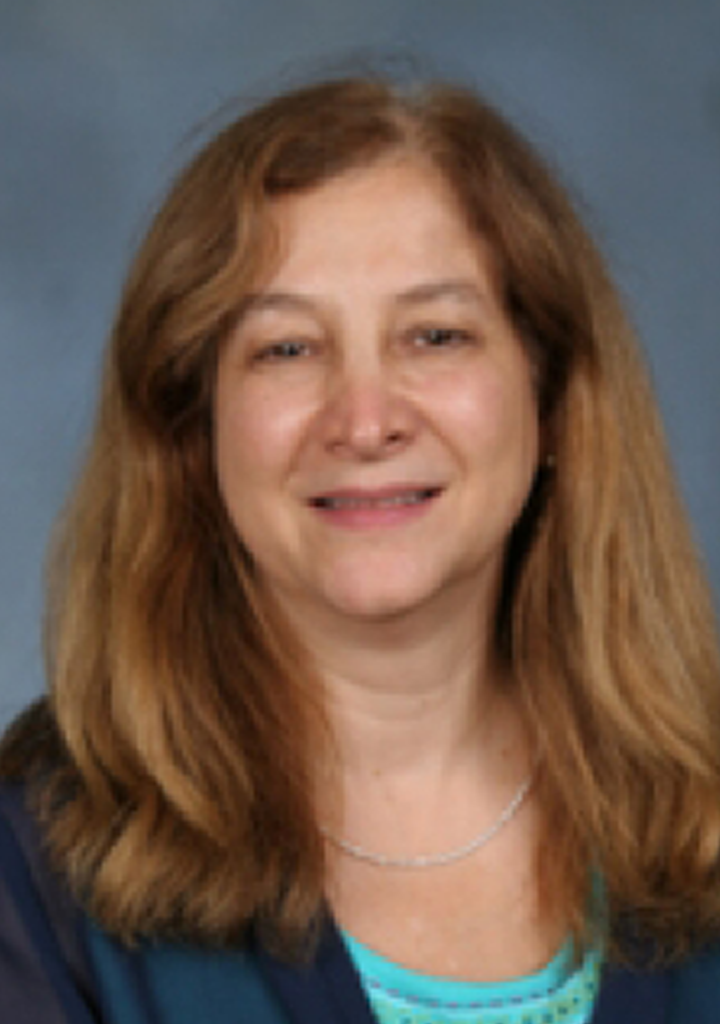
Phyllis Goldfarb
2007
Professor Emerita Phyllis Goldfarb became the first clinical dean with the endowed chair title, the Jacob Burns Foundation Associate Dean for Clinical Affairs. She served in this role until 2018. During her leadership, she built on the rich tradition that the Law School had and developed opportunities for each clinic to function as a whole rather than independently. Among her many accomplishments, she established a clinic newsletter, developed a clinical tenure track, and established the Friedman Fellowship program.
2008
The inaugural class of Friedman Fellows began teaching in the Clinical Program thanks to the generous gift from Philip Friedman. Over the years, the Program has provided fellows with two-year fellowships. Those positions offer lawyers the opportunity to work alongside experienced clinical faculty; teach, mentor, and supervise clinic students; practice public interest law; and, if desired, earn an LLM from GW. These fellowships also provide fellows with pathways to clinical opportunities in law schools across the country. While serving as the former Jacob Burns Foundation Associate Dean for Clinical Affairs, Professor Emerita Phyllis Goldfarb developed and taught the Fellow Clinical Pedagogy Seminar and mentored fellows.
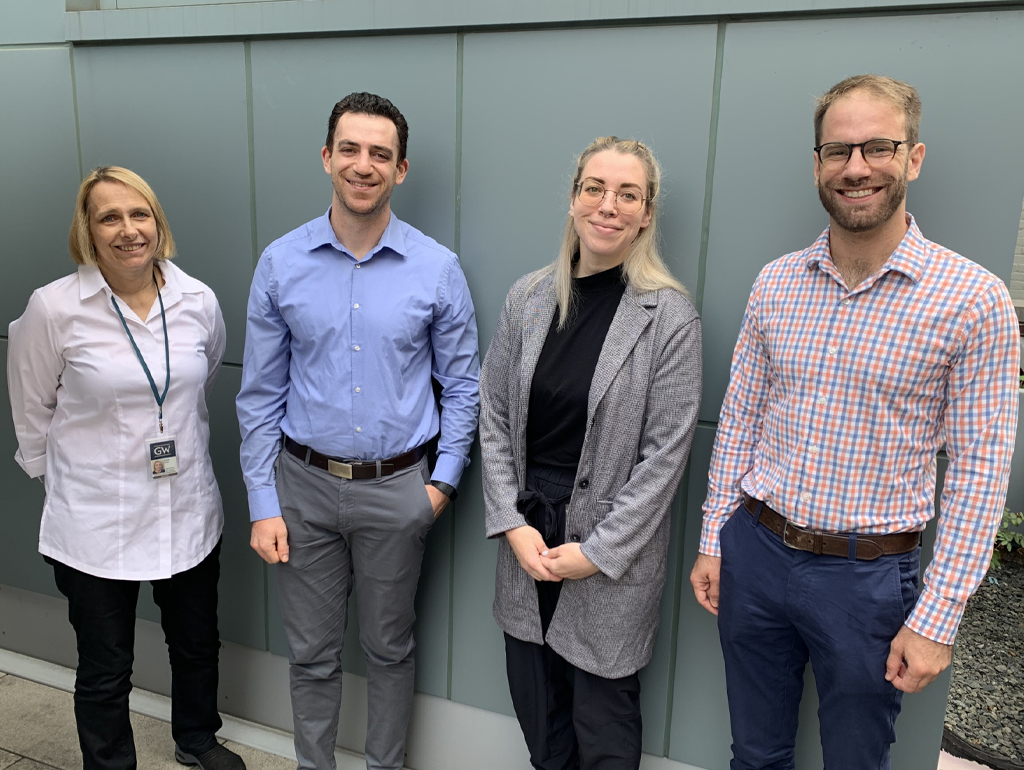
Left to Right: 2021-2023 Friedman Fellows Holly Eaton, Ilan Friedman-Grunsteinn, Elenore Wade, and Daniel Bousquet
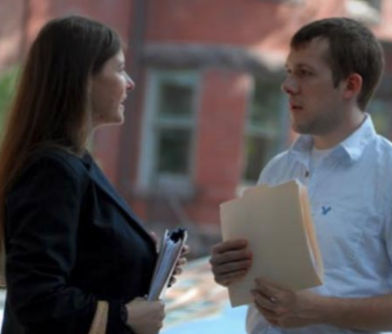
Paralegal Interns Sabrina Filomena and Andrew Toney from the inaugural year
The Clinic launched a pilot graduate-level paralegal internship program in collaboration with the GWU Paralegal Studies Program in the College of Professional Studies.
The Clinic created a new Managing Attorney position and hired Lisa Guffey, who served in the role until 2010. During her time, she helped implement an innovative case management system to track, monitor, and archive cases. She also established new programs, reorganized existing programs, improved case management systems, and generally enhanced the Clinical Program’s ability to effectively educate its students and serve clients.
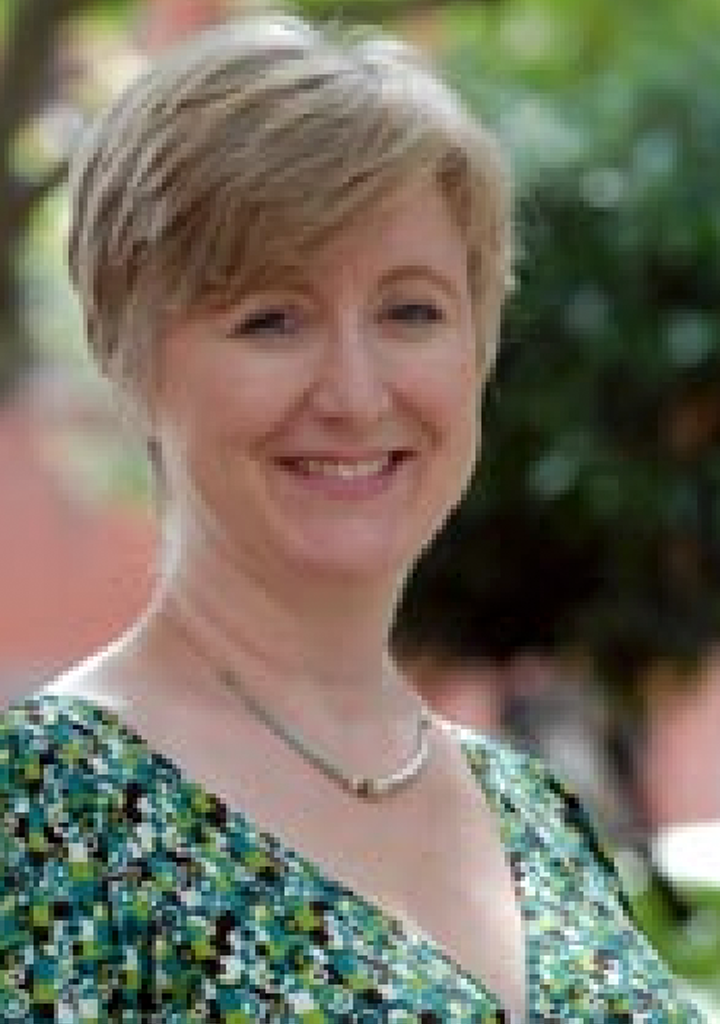
Lisa Guffey
[video:https://vimeo.com/706141993 width:560 height:315 align:center lightbox:1 lightbox_title:Consumer Mediation Clinic on NBC]
NBC featured the Consumer Mediation Clinic, taught by Professor Emerita Carol L. Izumi and Fellow Anastasia Boutsis, in a televised news story. After this TV profile aired, student-mediators fielded a significant increase of requests from metro-DC residents.
The United States Supreme Court decided the case of Giles v. California. The Court’s opinion was noticeably influenced by an amicus brief on which students in Professor Joan Meier’s Domestic Violence Project had provided assistance.
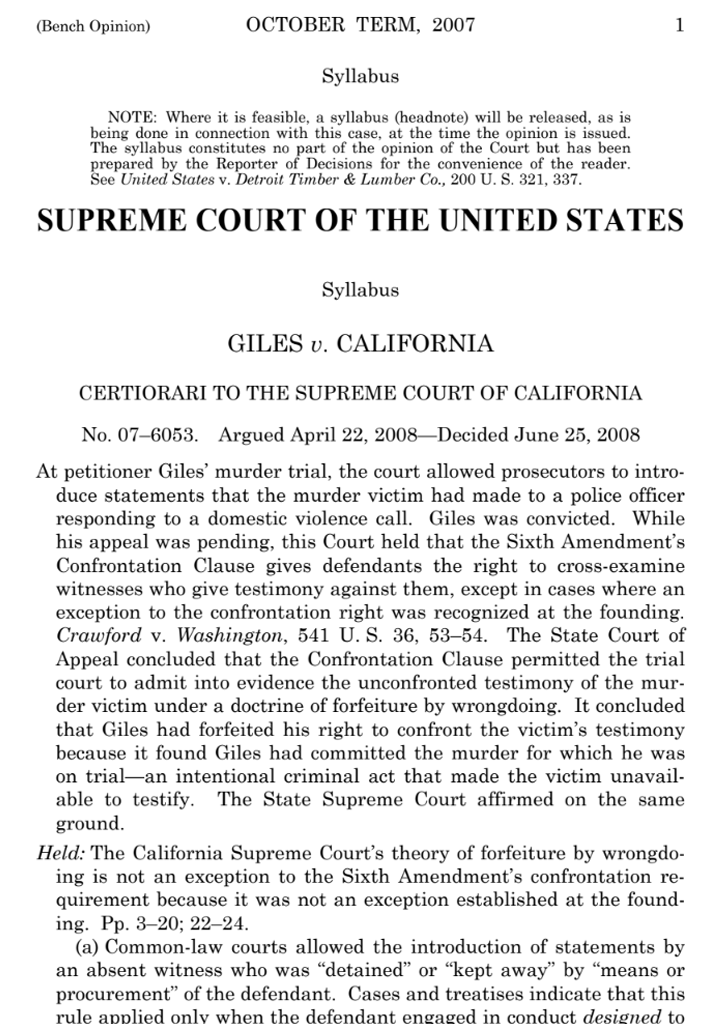
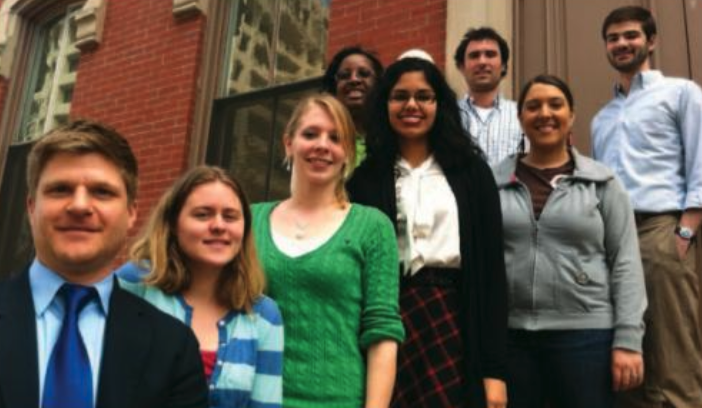
Daniel Gerken, Student Director (Left) with 2010-2011 Students Advisory Council
2008-2009
In the 2008-2009 academic year, the Clinics established a Student Advisory Council. The Committee is composed of a student representative from each of the clinics and meets regularly. The Clinics remain thrilled about the continued participation and input of our dedicated clinic students in the governance of the Clinics.
2010-2019: The Clinics Enter a New Era, and New Home
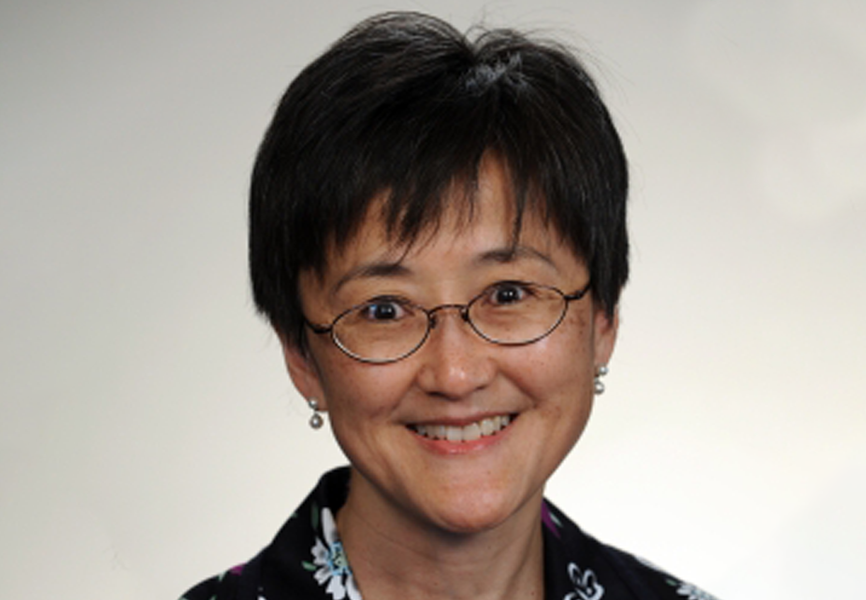
Carol L. Izumi
2010
After dedicating 24 years of service to the Consumer Medication Clinic, Professor Emerita Carol L. Izumi left the faculty and the clinic closed in 2010. Professor Emerita Carol L. Isumi concluded her role as the Director of Clinical Programs and GW's first Associate Dean for Clinical Affairs prior to this in 2007, after overseeing the Clinic's operation since 2003.
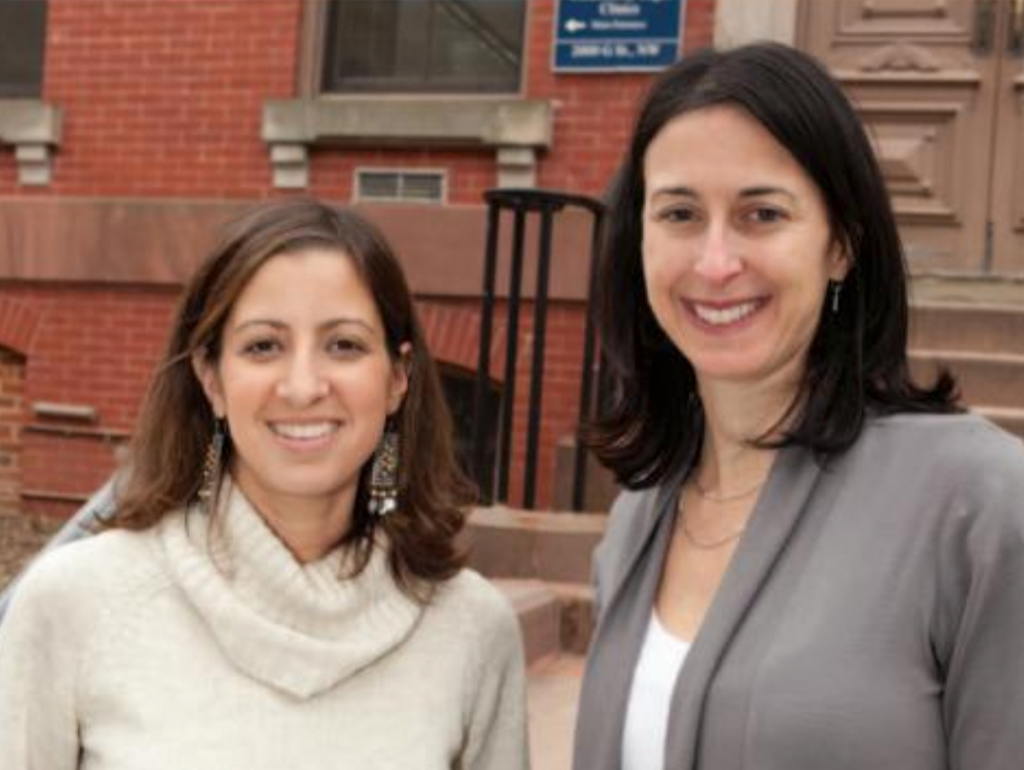
Jessica Steinberg and Laurie S. Kohn
Under the leadership of former Clinical Dean Phyllis Goldfarb, the law faculty voted to create clinical tenure.
Professor Joan H. Strand retired after 32 years of directing the Civil and Family Justice Clinic. Professor Laurie S. Kohn was hired as one of the first two tenure-track Associate Professors of Clinical Law in GW’s history. Professor Kohn transitioned Professor Strand’s clinic into the current Family Justice Litigation Clinic.
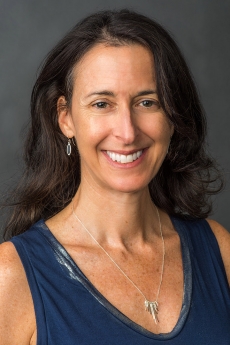
Laurie S. Kohn
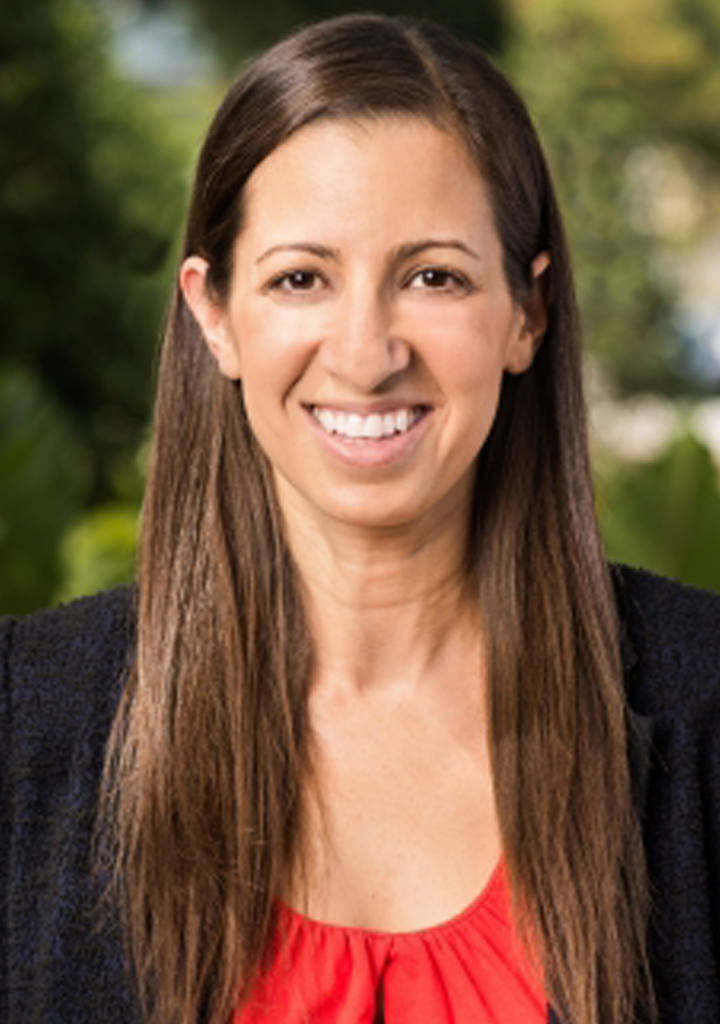
Jessica Steinberg
Professor Jessica K. Steinberg was hired as one of the first two tenure-track Associate Professors of Clinical Law in GW’s history. Professor Steinberg launched the Neighborhood and Policy Law Clinic (more recently called the Prisoner and Reentry Clinic) which she taught until 2022. The clinic represents prisoners and individuals facing legal barriers as a result of their criminal records. The clinic’s cases sit at the intersection of the civil and criminal justice systems and tackle issues related to mass incarceration, prisoner reentry, and the collateral consequences of criminal convictions.
GW Clinic Alumna Pallavi Rai Gullo (JD, ‘01) became the Managing Attorney of the Clinical Program, where she stayed until 2017. During her time with the Clinics she worked alongside former Dean Goldfarb to enhance the administrative and operational performance of the Clinics. She also routinely advised on Clinic policy, administrative, and faculty/student matters.
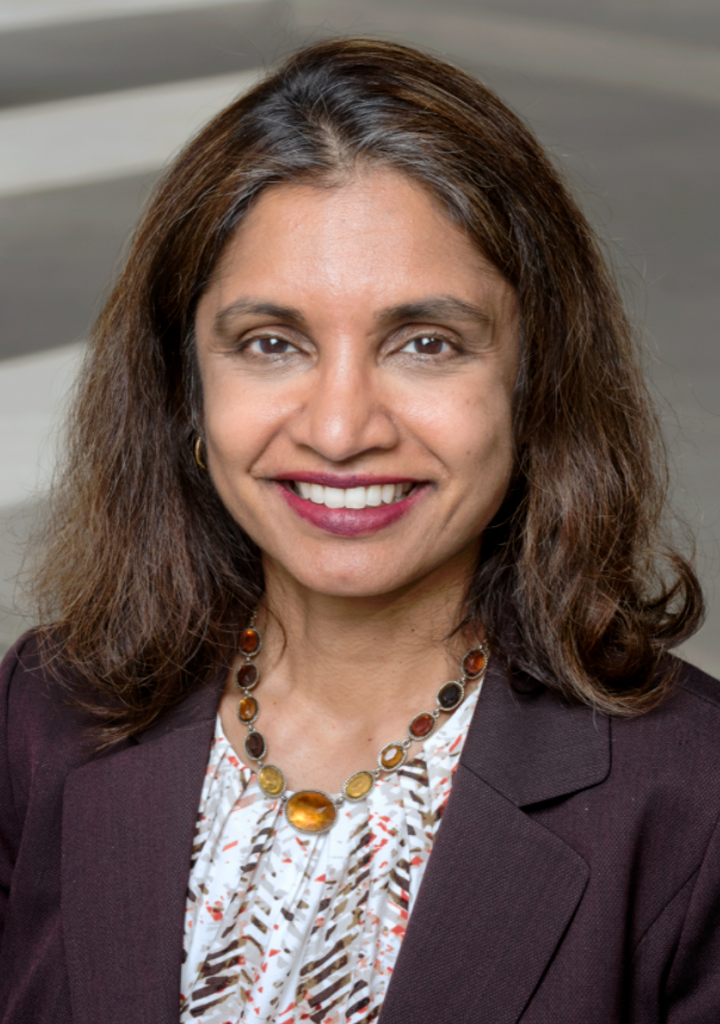
Pallavi Rai Gullo
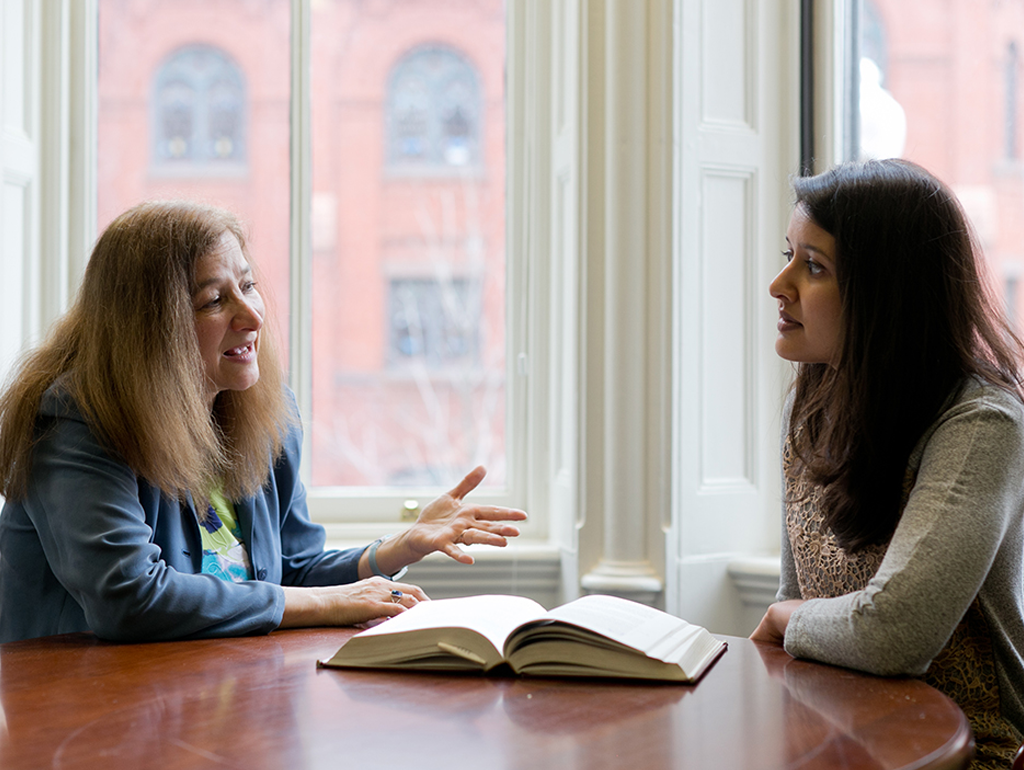
Phyllis Goldfarb sitting at a table talking with a student
2012
The Clinical Legal Education Association (CLEA) named Professor Emerita Phyllis Goldfarb, the former Jacob Burns Foundation Associate Dean for Clinical Affairs, as the recipient of its 2012 Outstanding Advocate for Clinical Teachers Award.
2014
Justice Sonia Sotomayor joined the George Washington University Law School community for a ribbon-cutting ceremony for the newly-renovated Jacob Burns Community Legal Clinic Building on 2000 G Street, NW.
Justice Sotomayor, former GW President Steven Knapp, former Interim Law School Dean Gregory E. Maggs Professor Emerita Phyllis Goldfarb the former Jacob Burns Foundation Associate Dean for Clinical Affairs, led the ribbon-cutting festivities.
[video:https://vimeo.com/90574037 width:560 height:315 align:center lightbox:1 lightbox_title:Supreme Court Justice Sonia Sotomayor Celebrates GW Law School Event]
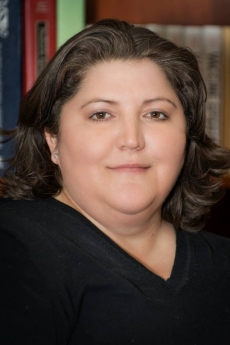
Renée Gentry
2015
Professor Emeritus Peter Meyers transitioned out of his role as the director of the Vaccine Injury Litigation Clinic, and into emeritus status. Shortly thereafter, Professor Renée Gentry was hired to help direct the clinic.
2016
In 2016, Professor Paulina Vera joined the Immigration Clinic to support the work of Professor Alberto M. Benítez. She is a double GW alumna and graduated from the George Washington University Law School in 2015. During law school, she was a student-attorney at the Immigration Clinic.
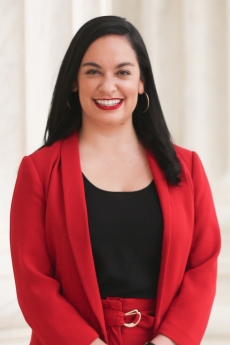
Paulina Vera
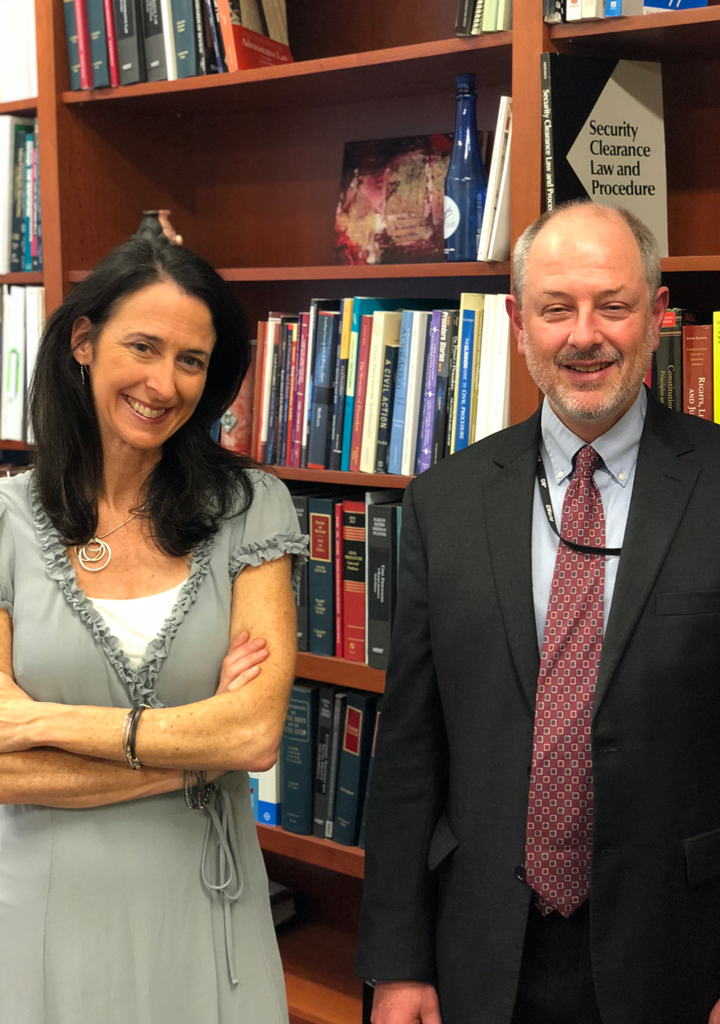
Laurie S. Kohn and Jeffrey S. Gutman
2019
Professors Jeffrey S. Gutman and Laurie S. Kohn co-directed the Clinical Program, and Professor Kohn served as interim Associate Dean from 2019-2021.
The Clinic re-established its collaboration with the GWU Paralegal Studies Program in the College of Professional Studies. The partnership with the GWU Paralegal Studies Program remains in existence.

Paralegal Interns Sabrina Filomena and Andrew Toney from the inaugural year
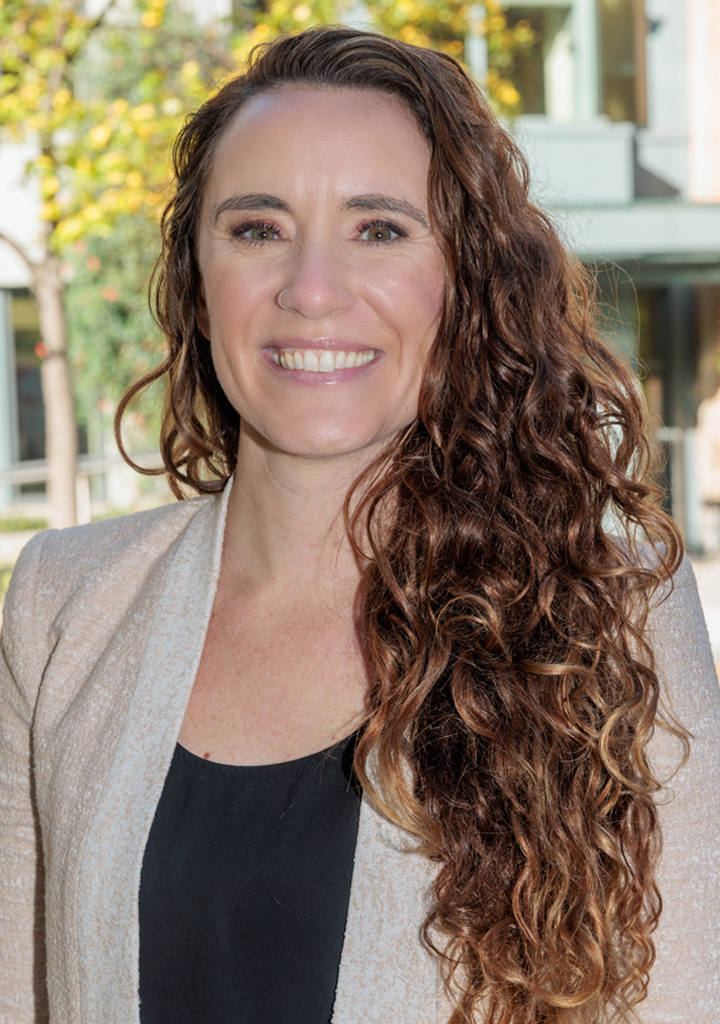
Bonnie McIntyre
GW Law and Catholic University of America (CUA) entered into a formal partnership to provide an internship placement at the Clinics for a CUA graduate student from its School of Social Work. Doctoral candidate Bonnie McIntyre began making her mark as the first Social Worker in the Clinical Program in 2019. Her service continued until 2022.
The Rising for Justice Celebration of Service featured video of GW Law Alumna, Courtney Luntz (JD ‘19) and her Clinic partner for their work responding to their client’s needs in eviction cases. During the Pandemic our work with Rising for Justice became even more critical to the surrounding community, and Law School Dean Dayna Bowen Matthew stood in strong support of Attorney General Garland’s call to the legal community to help our clients facing the threat of homelessness due to the end of DC’s COVID-19 Eviction Moratorium.
[video:https://www.youtube.com/watch?v=8YvPp3UhM2I width:560 height:315 align:center lightbox:1 lightbox_title:Rising for Justice 2019 Celebration of Service Client Video]
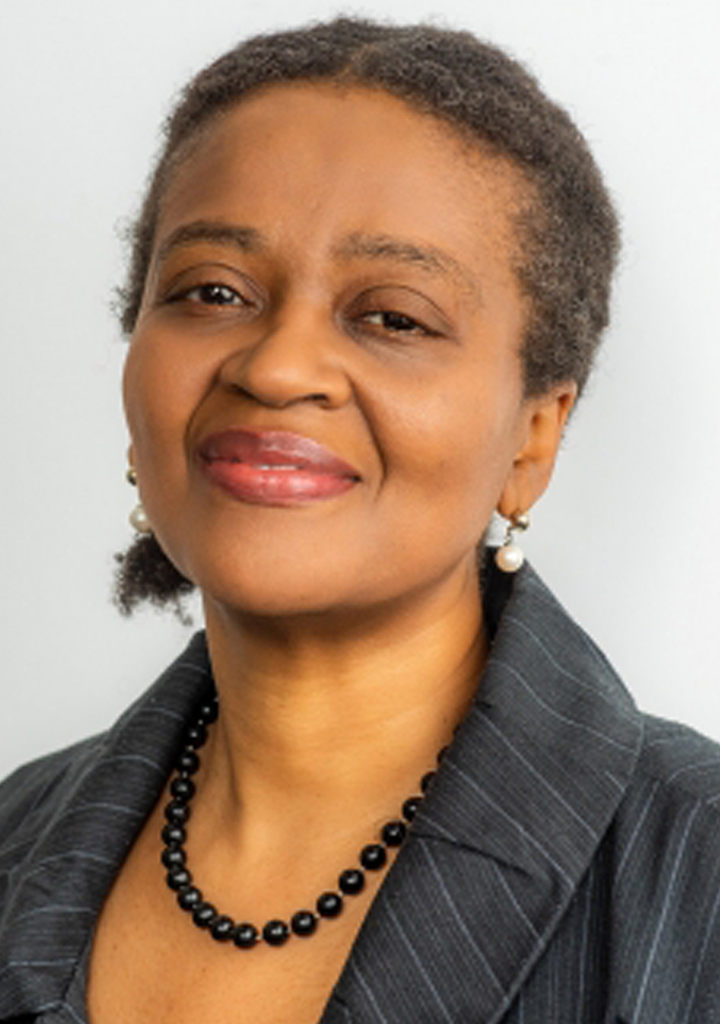
Melody Webb
Melody Webb became the Managing Attorney of the Clinics, where she remained until 2021. As a longstanding member of the public interest community in Washington, DC, Ms.. Webb helped the Clinic become actively involved in the DC Consortium, a community of over 1300 members from all corners of the legal community, including attorneys at law firms that do pro bono work, social services program staff, judges and court staff, and DC and federal government attorneys.
2020-Present: Expanding Opportunities for Public Service and Community Impact in the Clinics
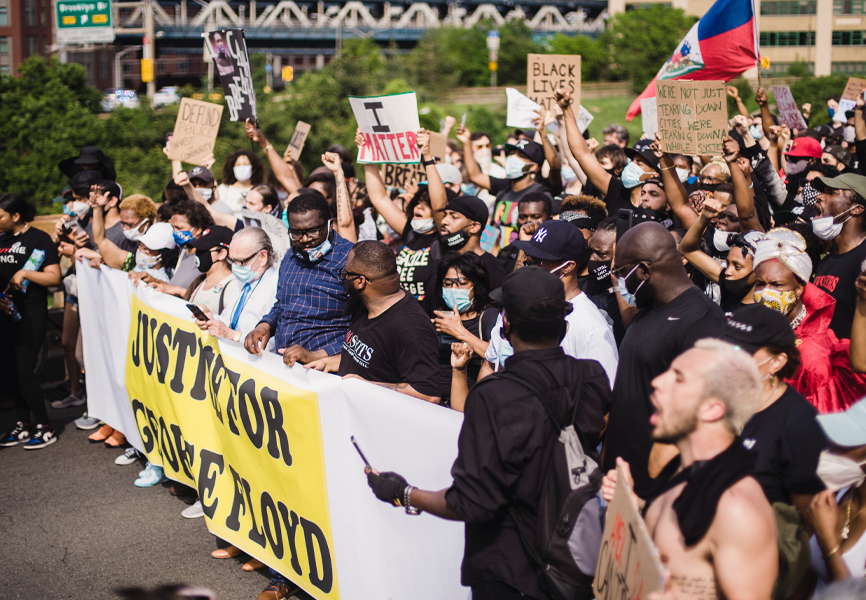
2020
Dean Laurie S. Kohn launched a Reading Group taught collaboratively by the Clinical faculty in response to renewed demands for racial justice that were born in the U.S., following the widely publicized murders of Black citizens by police. These incidents of racialized violence by agents of the state present one lens through which law students witness racism and racial bias in our country. The Reading Group examines the origins, wide-ranging expression, and persistence of structural racism in America and its profound deleterious impact on access to justice for people of color in all areas of public interest law.
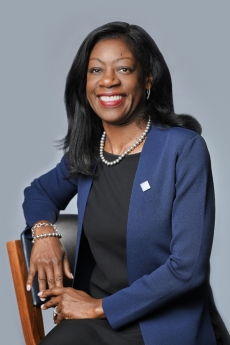
Dayna Bowen Matthew
2021
GW Law Dean Dayna Bowen Matthew announced the appointment of Professor Laurie S. Kohn as the Jacob Burns Foundation Associate Dean for Clinical Affairs. In this role, Dean Laurie Kohn has established multiple collaborations with the legal services community, the Law School’s alum network, the court system, and the University to develop a wide variety of innovative, interdisciplinary, and community-responsive clinical offerings. She set lofty yet attainable goals including providing clinical seats to all GW Law students who want them, offering an increasing array of clinics to respond to community needs and student interests, and supporting the law school’s commitment to professional development.
GW Clinic Alumna Andrea R. Willis-Johnson became the Managing Attorney & Associate Program Director of the Clinics. She brought with her deep insight into the Law School, passion for the clinical mission, entrepreneurial spirit, and experience helping mission-driven organizations maintain legal and regulatory compliance on the state and federal level.
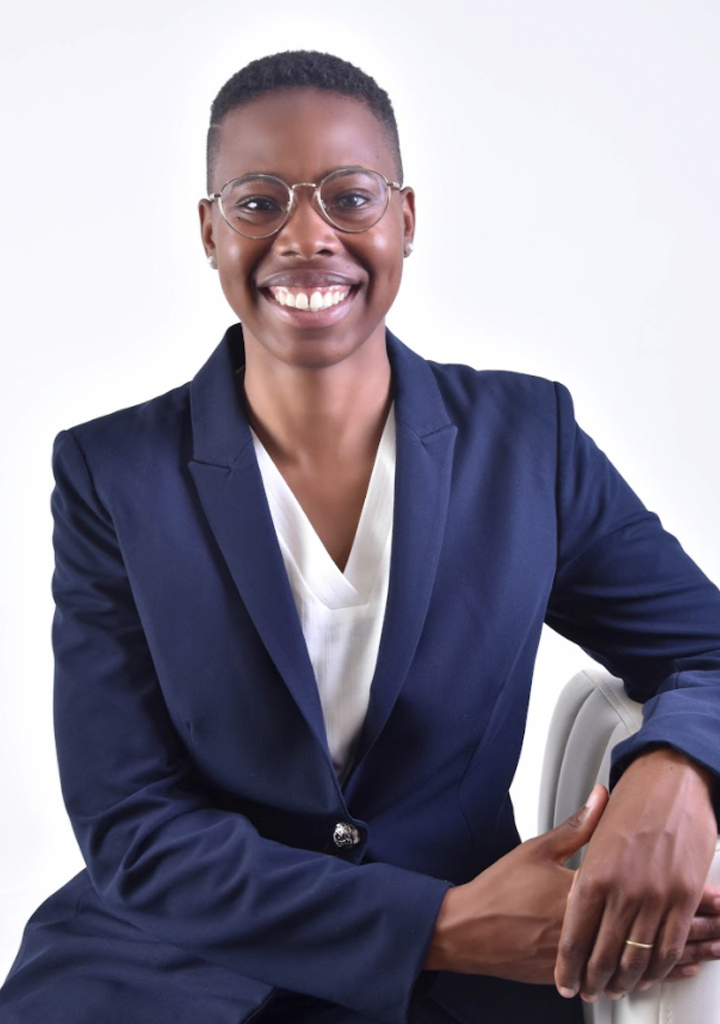
Andrea R. Willis-Johnson

The Clinical Program established an affinity group for Clinic alums and current student attorneys. During the COVID-19 pandemic, the affinity group has leveraged the LinkedIn platform which provides a central online community where current students and alums of the Clinics can come together for networking purposes and celebrate the work of the Clinics.
The Criminal Defense and Justice Clinic (CDJC) was launched to give students the opportunity to represent individuals charged with misdemeanors and to examine, consider, and act to remedy injustices in the criminal justice system. CDJC’s inaugural class was taught by Professors Lula Hagos and Friedman Fellow Ilan Friedmann-Grunstein.
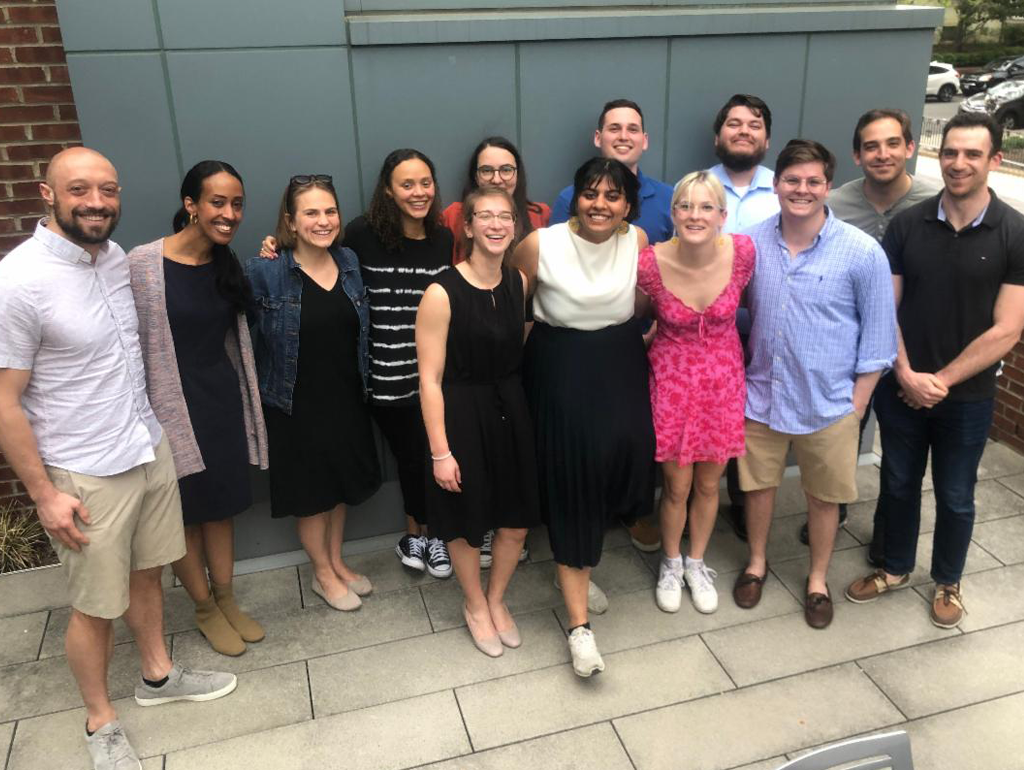
From Left: Spencer Satin (Class of '22), Professor Lula Hagos, Rebecca Hughes (Class of '22), Kendall Lawrenz (Class of '22), Jordan Crunkleton (Class of '22), Mengli Sun (Class of '22), Nicholas Mastria (Class of '22), Jennifer Pantell (Class of '22), Fatima Khan (Class of '22), Cameron Costello (Class of '22), Cyrus Dutton (Class of '22), Jacob Morse (Class of '22), Professor Ilan Friedmann-Grunstein.
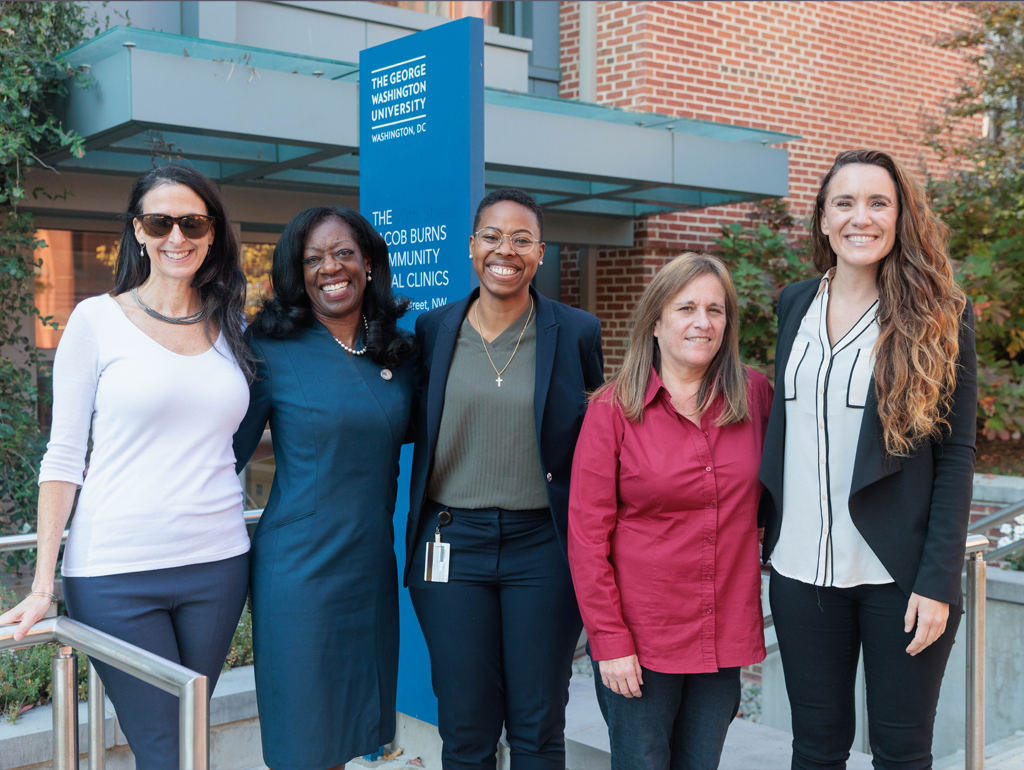
From Left to Right: Laurie Kohn (Clinical Dean), Dayna Bowen Matthew (GW Law Dean), Andrea Willis-Johnson (Managing Attorney & Associate Program Director), Milagros Tudela (Administrative Supervisor), Bonnie Mckintyre (Clinic Social Worker)
Law School Dean Dayna Matthew enjoyed a “Day in the Life of the Clinics.” Students, staff, and faculty met with Dean Matthew to expose her to the work of the Clinics and its student attorneys.
The Civil Access to Justice Clinic was launched, which is a 2-credit clinical model. The faculty voted to pilot this model to provide clinical opportunities to a wider range of students - particularly those who are not able to enroll in one of GW’s capstone clinics. The first division of this clinic was the Family Division, which focuses on addressing barriers to justice in the family law system.
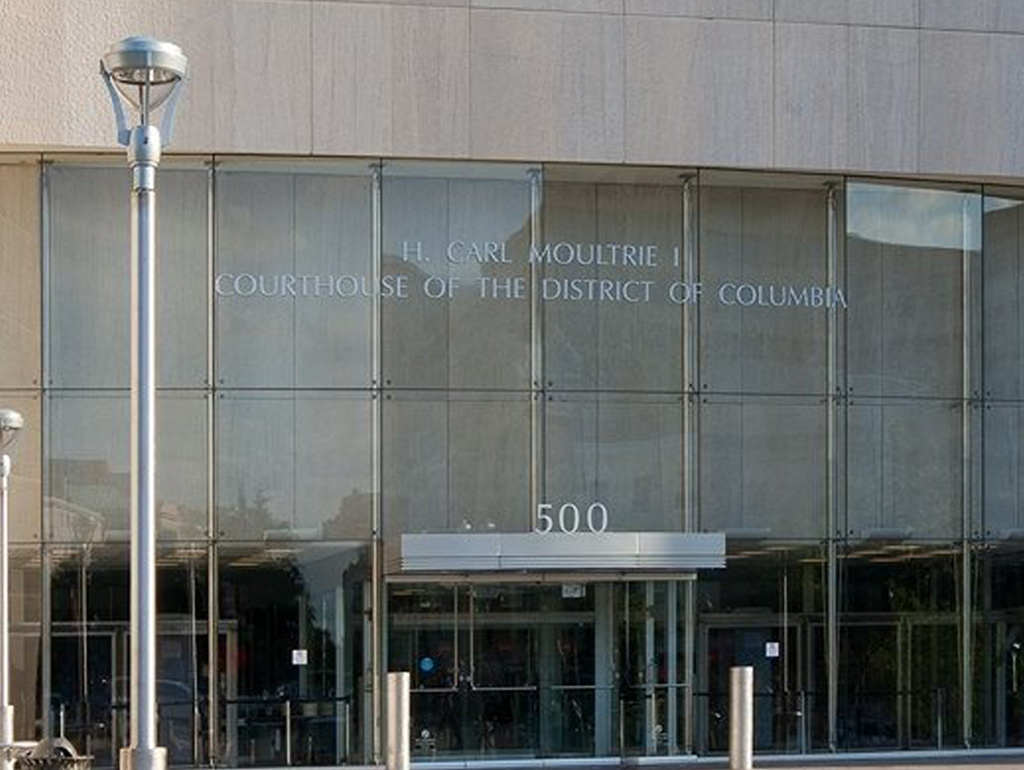
H. Carl Moultrie I Courthouse of the District of Columbia

2022
The Civil Access to Justice Clinic – Medical-Legal Partnership Division will launch as GW’s second 2-credit clinic. The Clinic provides holistic services to address health problems that arise at the intersection of law and medicine. Students in this clinic focus on removing barriers to access to major social determinants of health – decent, safe, affordable housing; quality health care; and pollution-free air and water. Students also work with clients to address health-harming infringements of these basic resources. This Clinic’s pilot has been made possible by the generous gift of two GW Law alums.
The Civil Access to Justice Clinic--Employment Division will launch as GW’s third 2-credit clinic. The Division provides access to justice in the employment context.
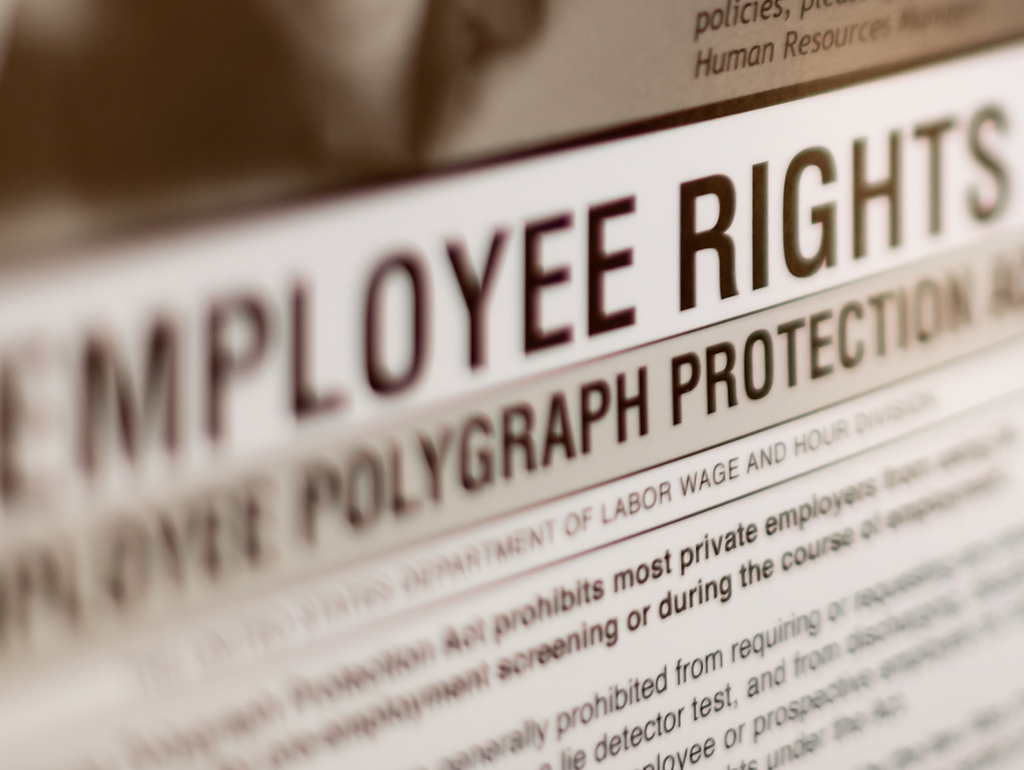
[video:https://vimeo.com/693638188 width:560 height:315 align:center lightbox:1 lightbox_title:Installation of Joan S. Meier as the National Family Violence Law Professor]
A $2.75 million gift from an anonymous donor recently endowed the new GW Law National Family Violence Law Center (NFVLC) Professorship, ensuring that this professorship continues in perpetuity. In recognition of her groundbreaking work to support victims of domestic violence, the George Washington University installed GW Law Professor Joan S. Meier as the inaugural holder of the National Family Violence Law Center Professorship. Professor Meier’s formal Professorship Induction Ceremony took place on March 24, 2022.
2022-2023
The IP & Technology Clinic will launch as the Clinic’s first clinic focused solely on intellectual property. The Clinic has been made possible by a generous bequest from a GW Law alumnus. This Clinic will be launched collaboratively by the Clinical Program and the Law School’s nationally-ranked Intellectual Property Law Program.


